- Utility Menu

Psychology Undergraduate Program
- Department of Psychology
- Summer Opportunities
Below, we've compiled several of the research and funding opportunities Harvard has to offer for undergrads over the summer. We've also included a few non-Harvard opportunities that Psychology students might be interested in!
Psych Department Research Opportunities - Summer 2024
Some Psychology department labs may have space for undergraduate summer research assistants. Please reach out directly to any labs you are interested in working with to ask about summer research opportunities.
Harvard-Wide Research Opportunities - Summer 2024
- BLISS - Behavioral Laboratory in the Social Sciences – Deadline extended to Monday, February 26, 2024, 12:00 PM EST. This is a 10-week program that provides room, partial board, and a small stipend to work in a social science laboratory on an established project. This program is NOT meant for independent projects or thesis research. It IS a great way for students to try out working in a lab for the first time or to try out a new lab topic. Several labs are from the psychology department or work on related topics in other schools or departments.
- KRANIUM - Kempner Research in Artificial and Natural Intelligence for Undergraduates with Mentorship – Deadline is February 14, 2024: A 10-week summer program sponsored by the Kempner Institute as part of the Harvard Summer Undergraduate Research Village (HSURV). Fellows will live in one of the Harvard College houses with other fellows in the Summer Undergraduate Research Village. As part of KRANIUM, fellows will participate in rich programming, including both social and academic activities, and become members of a vibrant intellectual and social summer community.
- PRIMO - Program for Research in Markets and Organizations – Deadline is February 14, 2024, 11:59 PM EST. A 10-week summer program that aims to build community and stimulate creativity among Harvard undergraduate researchers in business and related fields. To participate, you must apply and be selected to work in one of the research areas which span diverse topics (finance, organizational behavior, marketing, etc.), disciplines (Psychology, Economics, Sociology), as well as methods (quantitative or qualitative). Successful fellows will be placed with pre-designed faculty projects at Harvard Business School. PRIMO fellows are offered Harvard campus housing, a partial board plan, and modest research support.
- PRISE - Program for Research in Science and Engineering – Deadline is February 14, 2024, 11:59 PM EST. Provides Harvard College students conducting research in the sciences (including neuroscience) and engineering with housing, possible stipend, and earnings requirement. Do not need to have summer plans finalized by mid-Feb but must be in the process of finding a lab position.
- SHARP - Summer Humanities and Arts Research Program – Deadline is February 14, 2024, 11:59 PM EST. A 10-week immersive summer program that aims to build community and stimulate creativity among a small cohort of Harvard undergraduate researchers in the humanities and arts. SHARP fellows work on research projects with Harvard-affiliated faculty, researchers, and senior library and museum staff. Fellows live together in one of the Harvard College houses and participate in rich evening programming that includes both social and academic activities. To participate in SHARP, you must apply and be selected to work on one of the available SHARP research projects.
- SPUDS - Summer Program for Undergraduates in Data Science – Deadline is February 14, 2024, 11:59 PM EST. A 10-week summer program that aims provide a formative and substantive data science research experience and to promote community, creativity, and scholarship amongst Harvard College students. SPUDS will support Fellows who are interested in data science applications across the arts, humanities, sciences and more. Prospective fellows should seek a research collaboration with a Harvard faculty host, and apply to SPUDS directly through the Office of Undergraduate Research and Fellowships. It is not necessary to have secured a research position by the SPUDS application deadline. Fellows will work with Harvard-affiliated researchers and live in one of the Harvard College houses with other fellows in the Summer Undergraduate Research Village.
- The Summer Program in Biostatistics and Computational Biology – Applications due February 16, 2024. The Summer Program in Biostatistics and Computational Biology at the Harvard T.H. Chan School of Public Health is hosting its program on campus this year! The program, intended for undergraduate students and recent grads that are underrepresented in graduate education, provides a unique opportunity to learn about the use of quantitative methods for biological, environmental, and medical research alongside Harvard faculty, researchers, and graduate students.
- SURGH - Summer Undergraduate Research in Global Health Program – Deadline is February 4, 2024, 11:59 PM EST. SURGH offers Harvard undergraduates the opportunity to research critical issues in global health under the direction of a Harvard faculty or affiliate mentor. The program includes housing and a stipend.
- Herchel Smith Undergraduate Science Research Program – Deadline is February 4, 2024, 11:59 PM EST. Supports undergraduates who are conducting a promising summer research project in mathematics, engineering, life, physical/natural or computer sciences. The project can be based anywhere in the world (including US), but must be affiliated with a university, lab or research enterprise and be highly substantive: at least 10-weeks in duration, full-time in commitment, and exhibiting some degree of autonomy and input by the applicant in its design and execution.
- McLean Mental Health Research Summer Program – Deadline is February 9, 2024, 11:59 PM EST. MMHRSP is a 10-week neuroscience and clinical psychology research experience for individuals from underrepresented groups in mental health research careers. MMHRSP offers hands-on, mentored research at McLean Hospital -- Harvard Medical School’s primary psychiatric teaching hospital. MMHRSP aims to increase representation in mental health research and careers (including neuroscience, clinical psychology, and psychiatry) by providing paid research opportunities, committed long-term mentorship, academic networking, and community engagement.
Non-Harvard Opportunities - Summer 2024
The American Psychological Association maintains a list of Undergraduate Research Opportunities and Internships ; check it out for additional non-Harvard summer research opportunities!
- Clinical Research Intern Positions in the Dauten Family Center for Bipolar Treatment Innovation at Massachusetts General Hospital - Applications reviewed on a rolling basis. The Massachusetts General Hospital Dauten Family Center for Bipolar Treatment Innovation (DCBI) is seeking applicants for a Clinical Research Intern (CRI) position for Summer 2024. The aim of the DCBI is to evaluate psychiatric and psychosocial treatments for bipolar disorder, to learn more about the causes and general course of this disorder, and to investigate the pathophysiology of the condition with neuroimaging and other biological markers. Our clinic participates in large-scale, multi-site, NIMH, industry, and privately-sponsored initiatives.
- Summer Treatment Program with the Center for Children and Families at Florida International University - Applications reviewed on a rolling basis. The Center for Children and Families' Children's Summer Treatment Program (STP) is an award winning, evidence-based program for children ages 3-12 with ADHD and related behaviors. Counselors are assigned to groups of 10-15 children, with 4-5 counselors per group and will receive extensive clinical training . Counselors will provide feedback to children and parents and record behavioral data for children in their groups while also receiving daily performance feedback from experienced staff members who provide live supervision.
- Hastings Center Summer Bioethics Program for Underrepresented Undergraduates - Applications due Friday, February 23, 2024 at 11:59 PM ET. Applications are now open for the 2024 Hastings Center Summer Bioethics Program for undergraduate students from underrepresented groups in bioethics. These groups include and are not limited to communities of color, Indigenous communities, rural residents, and students with disabilities. The five-day live online program will take place from June 3-7, 2024 (11am-5pm ET). Participants will have the opportunity to engage with distinguished scholars from around the country and learn about theoretical and applied issues in bioethics. Participants will develop skills in clarifying, explaining and justifying their views on topics in bioethics, and in listening with respect to divergent views. Students who complete all program requirements will receive a stipend of $500.
- APA Summer Undergraduate Psychology Experience in Research (SUPER) Fellowships - Applications due Friday, March 1, 2024. Undergraduate students who are enrolled in the Fall 2024 term and committed to equity, diversity, and inclusion are encouraged to apply for the APA SUPER Fellowship, which provides a $4,000 stipend to the student to conduct summer laboratory research and $1,000 to their faculty host. Projects must be student-driven and supervised by a faculty member with sufficient resources to support the proposed work, although collaboration with postdoctoral fellows, graduate students, and other research staff is encouraged.
- MindCORE Summer Research Fellowship Progam - Applications due January 1, 2024. The MindCORE Summer Fellowship Program is a paid 10-week program at the University of Pennsylvania in Philadelphia from June 2 - August 9, 2024. Summer Fellows are matched with select MindCORE faculty in interdisciplinary mind and brain studies based on student research interest and mentor preference. With their mentors, students embark on a research project shaped as much as possible by their interests.
- Summer of Translational Aging Research for Undergraduates (STAR U) Program - Applications due January 17, 2024. STAR U is a 2-month fully funded research training program at Columbia University that is designed to encourage undergraduate students from diverse and underrepresented communities to pursue further graduate studies and careers in aging and neuroscience-related research. Throughout the summer, in addition to carrying out an individualized research project alongside Columbia faculty, students engage in a range of learning and professional development opportunities and become part of a supportive learning community.
- Undergraduate Summer Brain Research Program - Applications due February 5, 2024. The Institute for Human Neuroscience at Boys Town National Research Hospital is inviting applications to the Undergraduate Summer Brain Research Program. The 10-week paid intensive research opportunity begins on May 20, 2024 and ends on July 26, 2024. Housing is provided for students from outside of the Omaha metro area. Students accepted to the program will be matched with experienced and well-funded faculty mentors to conduct in-depth research and data analysis in human neuroscience. Accepted students will also attend a variety of learning activities, including professional development workshops, journal clubs, lab meetings, and summer retreat presentations.
Harvard Summer School
CERTAIN Psychology courses offered by the Harvard Summer School will automatically count for concentration or secondary field credit if you have not already taken the equivalent course during the academic year. Please see the "Certain Harvard Summer School Courses" section of our Departmental Advanced Courses page for a list of these courses and for other important information regarding departmental credit.
- Finding a Research Lab
- Course Credit for Research
- Post-Graduate Research Jobs
Summer Research Opportunities at Harvard
Share this page.
This program is offered through Harvard Griffin GSAS and the Leadership Alliance .
During this 10-week program, Summer Research Opportunities at Harvard (SROH) interns conduct research and participate in discussions with Cambridge-based Harvard faculty, build their presentation and research discussion skills, and take part in field trips with other Harvard summer programs. Students in the program live in Harvard housing and enjoy access to the outstanding resources of the university.
The program is funded by Harvard Griffin GSAS, Harvard Molecules, Cells, and Organisms , Harvard Genes, Ecosystems, Organisms , and the Leadership Alliance .
Note that we also have funding for students interested in atmospheric sciences as part of the NSF-supported International Partnership in Cirrus Studies project, a collaboration including the University of Chicago, Harvard University, Princeton University, the University of Washington, and multiple European institutions. The University of Chicago has information on participating faculty . Research focuses on modeling and measurement of high-altitude clouds.
Applicants in the social sciences and humanities should feel free to write to the SROH program and indicate which Harvard faculty they have identified in their area(s) of interest and whether or not they have been in contact with said faculty.
NEW! The Department of the Classics would welcome applicants interested in fields related to Greco-Roman antiquity, including, but not limited to Republican and Imperial Latin literature, Cicero and Roman oratory, Latin historiography, reception of Latin literature, and the history of classical scholarship.
Application Process
SROH takes place between June and August. For information on eligibility requirements and how to apply, please visit the Leadership Alliance Summer Research-Early Identification Program.
Applications open on November 1, 2022, and must be submitted by February 1, 2023.
Room, Board, and Stipends
The in-person version of the program covers travel to and from the program, housing, and typically a stipend of $3,500 and a food allowance of $1,500. Students participating in MARC or similar programs that provide summer support are welcome to apply. Students are required to participate for the full period of the program.
Looking for other opportunities for summer research at Harvard?
EXPLORE OTHER SUMMER PROGRAMS
APPLICATION DEADLINE
Questions about the program.
- Current Board Members
- Guidelines for decision-making
- Listserv Guidelines
- Make a donation
- Executive Board Statement Against Torture
- SSCP Letter of Support of ABCT and Sexual and Gender Minority Special Interest Group
- About the SSCP Diversity Committee
- Resources on Racism
- Reflection Questions
- 2020 Clinical Science Visionary Award
- 2021 Clinical Science Visionary Award
- Distinguished Scientist Award - Previous Winners
- Previous winners
- Application Guidelines
- Previous awardees
- SSCP Mentoring Impact Award
- Service Award
- SSCP Diversity Awards
- SSCP Social Justice Impact Award
- Early Career Award Winners
- Student Clinican Award - Previous Winners
- Outstanding Student Diversity Research Award Winners
- Membership application
- Why join SSCP?
- How to renew
- Applying membership discounts
- Multi-year discounts
- International discount
- Program Discount
- Members-only content
- Anonymous Post Request
Summer Research Opportunities
- Clinical Science Organizations
- Patient Bill of Rights
- Internship Guide
- Transcript for Maximizing Exposure Therapy...
- Measuring Client Progress in Therapy
- Strategies for Treating Rumination
- Targeting Mental Imagery in Depression
- CAAPS Expert Media Panel
- Continuing Education Initiative
- Virtual Clinical Lunch
- Student Awards
- Student Resources
Is your program missing from the list?
Contact Rosanna Breaux ([email protected]) with your program name, location, and link for your program's website.
Albert Einstein College of Medicine Bronx, NY Summer Undergraduate Research Program
Big Ten Academic Alliance Champaign, IL Summer Research Opportunities Program
Boston University
The Boston University Summer Study Internship Program
Summer Undergraduate Research Fellowships
Brown University Providence, RI Summer Research Early Identification Program
Carnegie Mellon University
Pittsburgh, PA
Summer Undergraduate Research Fellowship (SURF)
Children's Hospital Research Foundation of Cincinnati Cincinnati, OH Summer Undergraduate Research Fellowship (SURF) Program
Drexel University College of Medicine Philadelphia, PA STAR SCHOLARS Summer Undergraduate Research Fellowship
Georgia State University, Neuroscience Institute Atlanta, GA B&B Summer Scholars Program
Harvard University/Harvard Medical School Boston, MA
Laboratory for Developmental Studies Summer Internship
Johns Hopkins University School of Medicine Baltimore, MD Summer Internship Program (SIP)
Louisiana State University Health Sciences Center New Orleans, LA
LSUHSC New Orleans, Summer Research Internship Program
Mayo Clinic Rochester, MN Summer Undergraduate Research Fellowship
Medical College of Wisconsin Milwaukee, WI Summer Program for Undergraduate Research
National Institutes of Health Bethesda, MD
Summer Program in the Neurological Sciences
Northwestern University Evanston, IL Summer Research Opportunity Program
Penn State University, College of Medicine Hershey, PA SURIP – Summer Undergraduate Research Internship Program STEP-UP - Short-Term Educational Program for Underrepresented Persons
Stanford University School of Medicine Stanford, CA Stanford Summer Research Program (SSRP)/Amgen Scholars
The Leadership Alliance
Summer Research - Early Identification Program (SR-EIP)
University of Arizona Tucson, AZ Summer Research Institute
University of California, Irvine
Irvine, CA Summer Undergraduate Research Program
University of California, Los Angeles Los Angeles, CA Summer Programs for Undergraduate Research
University of Chicago Chicago. IL The Leadership Alliance & The University of Chicago Summer Research Early Identification Program
University of Illinois at Chicago Chicago, IL Summer Research Opportunities Program (SROP)
University of Mississippi Jackson, MS Summer Undergraduate Research Experience (SURE)
University of Nebraska - Lincoln Lincoln, NE Undergraduate Summer Research Program – Minority Health Disparities
University of New Mexico School of Medicine Albuquerque, NM Undergraduate Pipeline Network Summer Research Program
University of North Carolina
Chapel Hill, NC
Karen M. Gil Internship Program
University of Oklahoma Health Sciences Center Oklahoma City, OK Native American Center for Health Research Summer Undergraduate Research Experience Summer Undergraduate Research Experience
University of Pennsylvania Philadelphia, PA Undergraduate Clinical Scholars Program
University of Pittsburgh Pittsburgh, PA Summer Undergraduate Research Program
University of South Florida
Summer Research Institute
University of Texas Galveston, TX Neuroscience Summer Undergraduate Research Program
University of Utah Salt Lake City, UT Native American Summer Research Internship (NARI)
University of Virginia
Charlottesville, VA Minority Health International Research Training Program (MHIRT)
Summer Undergraduate Research Program (SURP)
University of Washington Seattle, WA University of Washington Summer Undergraduate Research Program
University of Wisconsin Madison, WI Psychology Research Experience Program
Virginia Tech
Blacksburg, VA
Black College Institute
- Grants & Awards
Department of Psychology
Dietrich college of humanities and social sciences.
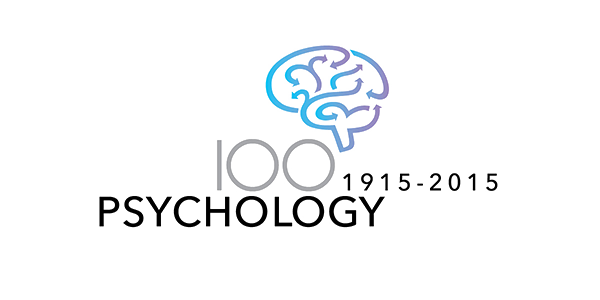
Summer Program for Undergraduate Researchers (SPUR)
The Summer Program for Undergraduate Research (SPUR) is designed to increase diverse representation in academic and research careers within psychological science. We encourage students from resource limited backgrounds to apply, including first-generation college students, economically disadvantaged students, and students with disabilities.
The SPUR program allows talented undergraduates to spend 8 weeks on campus, June 3– July 26th 2024, in a research laboratory at Carnegie Mellon University. Each student will receive a fellowship stipend of approximately $5000 and apartment-style housing. Guidance and supervision of a research project will be provided by a faculty member as well as, in some cases, a postdoctoral fellow and/or advanced graduate student. Admitted students will also participate in the Go Research! Summer Program at CMU. This program brings undergraduate researchers from across departments together in apartment-style dorms with resident assistants to facilitate community building and manage housing. The SPUR Workshop Series, hosted by members of the Psychology department and CMU affiliates, aims to prepare students for graduate education and/or research careers. Through technical coursework, support seminars and a professional development series, the program will actively engage students to be reflective while also allowing them to expand their research knowledge.
Please note that due to program funding requirements, only U.S. citizens, U.S. Nationals or permanent residents who are currently enrolled in a full time baccalaureate institution will be considered. Students who are enrolled in institutions with little to no STEM research opportunities are strongly encouraged to apply.
Learn more about SPUR [Powerpoint]
SPUR Application
Application opens - December 1, 2023 Application closes - January 29, 2024 Notifications of program acceptance by February 16, 2024
Current and Previous Summer Research Programs
- Community Standards
- Faculty Resources
Summer Research Opportunities
This page contains a number of summer research opportunities that students at UNC can take advantage of. This list is constantly being updated as opportunities arise and change. We encourage you to email us with any updates or additions.
Note that applications for some programs might not open yet, depending on when you access the links below. You can also browse Additional Undergraduate Research Programs and Fellowships as well as look at some other opportunities outside of UNC .
Remember you can always ask OUR staff and faculty liaisons , Department Liaisons , and/or Student Ambassadors to help you navigate your research path and make connections both inside and outside of the UNC research ecosphere. The OUR also maintains a rich database of research opportunities as other resources which can help you find various dynamic and engaging research programs. UNC has a variety of research centers that might also help!
Opportunities at UNC
- McAllister Heart Institute Summer Research Experience
- UNC E ducational Pathways to Increase D iversity in GE nomics (EDGE Genomics)
- 21st Century Environmental Health Scholars
- Carolina Population Center’s Summer Undergraduate Internship Program
- Carolina Summer Fellowship (CSF) Program
- FERN: Fellowship for Exploring Research in Nutrition
- IEHS Undergraduate Research Opportunity Program (UROP)
- Karen M. Gil Internship Program
- Seeding Postdoctoral Innovators in Research and Education (SPIRE) for Undergraduates
- Summer Undergraduate Research Fellowship (SURF)
- Summer Award for Research Courses
- Summer Undergraduate Pipeline (SUP)
- The Jenner Carey Bryan Award for Research
- The Moore Undergraduate Research Apprentice Program (MURAP)
- The Partners Cancer Biology Program
- The Summer Undergraduate Research Experience (SURE-REU) Program in Biological Mechanisms
- Summer Undergraduate Research Opportunity in Chemistry (SUROC)
- UNC—Intel Research Experience for Undergraduate Students
- UNC School of Medicine Summer Program Directory
Opportunities Beyond UNC
- Association of American Medical Colleges Summer Undergraduate Research Programs
- American Chemical Society Internships for Undergraduate Chemistry Students
- American Chemical Society Research, Internships, and More
- American Heart Association Summer Undergraduate Training
- American Mathematical Society Research Experience for Undergraduates Summer Programs
- American Psychological Association Undergraduate Research Opportunities & Internships
- American Psychological Association Summer Undergraduate Psychology Experience in Research (SUPER) Fellowship
- Amgen Scholars
- Arcadia Abroad
- Berkeley Early Learning Lab Summer Internship Program
- California Institute of Technology Amgen Scholars
- California Institute of Technology Summer Undergraduate Research Fellowships (SURF)
- California Institute of Technology LIGO Summer Undergraduate Research Fellowships (SURF)
- California Institute of Technology SURF-the-WAVE (STW)
- California Institute of Technology KAVLI Nanoscience WAVE Fellowship
- Columbia Business School Summer Research Internship Program
- Duke Center for REsearch to AdvanCe Healthcare Equity (REACH Equity)
- FAO Schwarz Fellowship Program
- “Future Physicist International Summer Camp” at University of Science and Technology of China
- Harvard Business School Program for Research in Markets & Organizations
- International Scholarships
- Leadership Alliance Summer Research Early Identification Program (SR-EIP)
- National Institute of Environmental Health (NIEHS) Sciences Scholars Connect Program
- National Endowment for the Humanities
- NCI Division of Cancer Biology Summer Undergraduate Research Program
- NextGenPop (Next Generation of Scholars in Population Research)
- Novartis Undergraduate Summer Research and PostBac Internship Programs
- Oak Ridge National Laboratory
- OHSU Cell, Developmental & Cancer Biology Summer Research Internship
- OHSU Biomedical Engineering Summer Internships
- Pathways to Science
- PIVOT Funding Database
- Pritzker School of Medicine at the University of Chicago Summer Pathway Programs
- Purdue CISTAR Research Experience and Mentoring (REM)
- Purdue SCALE Summer Research
- Purdue University Summer Undergraduate Research Fellowship (SURF)
- Rutgers RISE Program
- Scholarships for Development (Internationally-oriented)
- Summer Internship Program in Diabetes at the Helmholtz Munich (SIP)
- ThinkSwiss Research Scholarship
- UCLA Summer Programs for Undergraduate Research (SPUR)
- University of California — Irvine Undergraduate Research Opportunities Program (UROP)
- University of Houston – Houston Experience for Advancing Research and Training (UH-HEART)
- University of Nebraska-Lincoln Summer Research Program
- University of Missouri – Interpersonal Relationships Summer Research Program
- University of Pennsylvania MindCORE Summer Fellowship Program
- US Department of Energy Science Undergraduate Laboratory Internships (SULI)
- U.S. Department of Homeland Security
- U.S. National Institutes of Health
- U.S. National Science Foundation Research Experiences for Undergraduates
- U.S. National Science Foundation Summer Scholars Internship Program
- Washington State University Summer Research Opportunities
Apply for Summer 2024
Johns hopkins university | summer at hopkins.
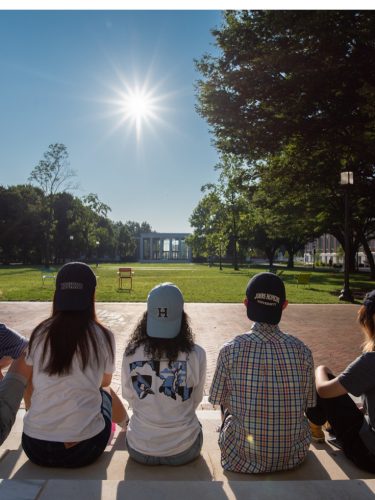
There’s nothing like summer at Johns Hopkins
What kind of student are you.
Whether you’re an academically advanced high school student or an undergraduate enrolled at JHU or elsewhere, Summer at Hopkins is your opportunity to tackle challenging coursework taught by world-renowned instructors in an environment that thrives on discovery and discussion.
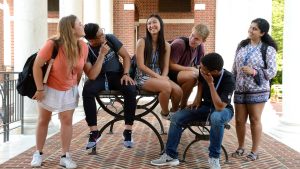
What Interests You Most?
Pursue your passion through a variety of programs and courses offered across a range of in-demand areas of study.
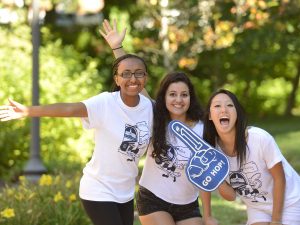
Build the skills and confidence you’ll need to enter the medical or healthcare sector.
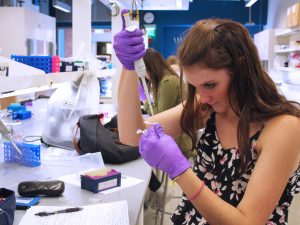
Develop your STEM skills through a broad range of courses taught by JHU’s esteemed instructors.
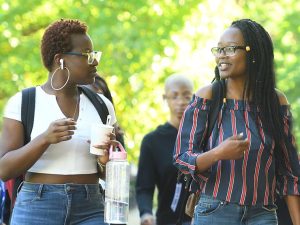
Investigate the fundamental questions of behavior, the mind, and brain science.
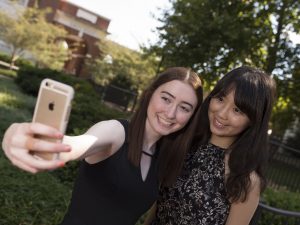
Build a scientific understanding of how society works and how we relate to one another.
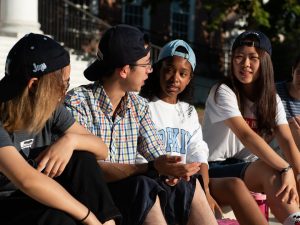
Develop your creativity, learn a new language, and deepen your understanding of the world.
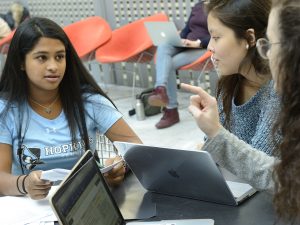
Study media's impact on society, create compelling content, and collaborate with seasoned professionals.
Why Choose Summer at Hopkins?
Whether you’re with us for two weeks or ten, learning online or in person, Summer at Hopkins will help you advance your knowledge and create lasting connections with friends and mentors.
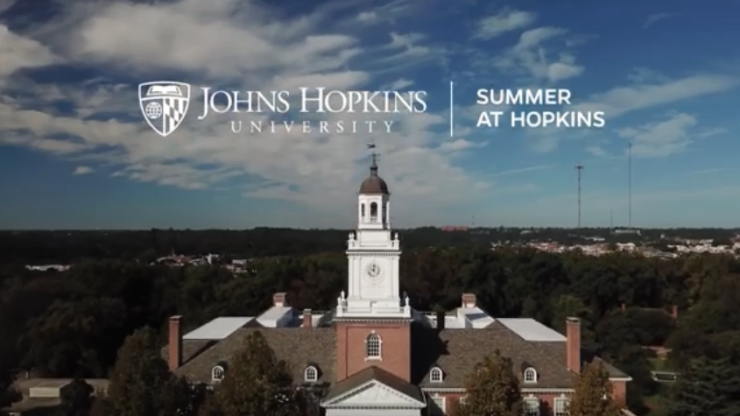
Benefit from JHU’s Academic Excellence
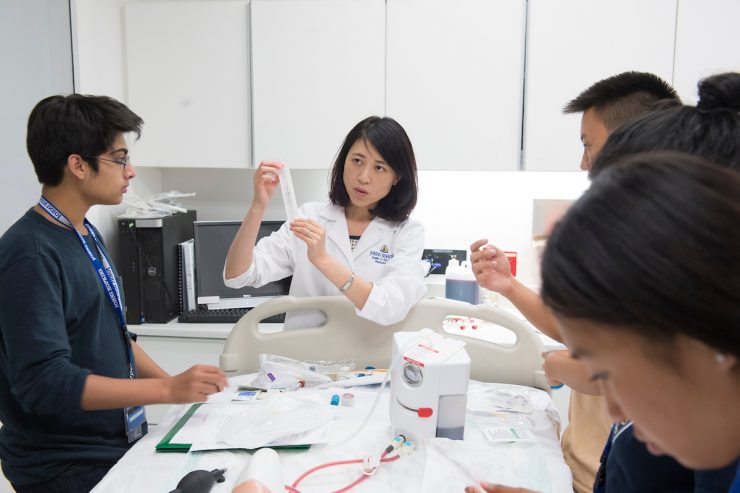
Learn from World-Renowned Faculty
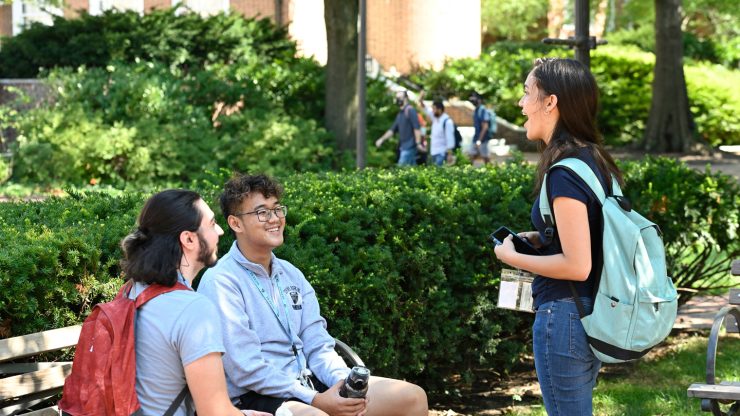
Join a Vibrant Community
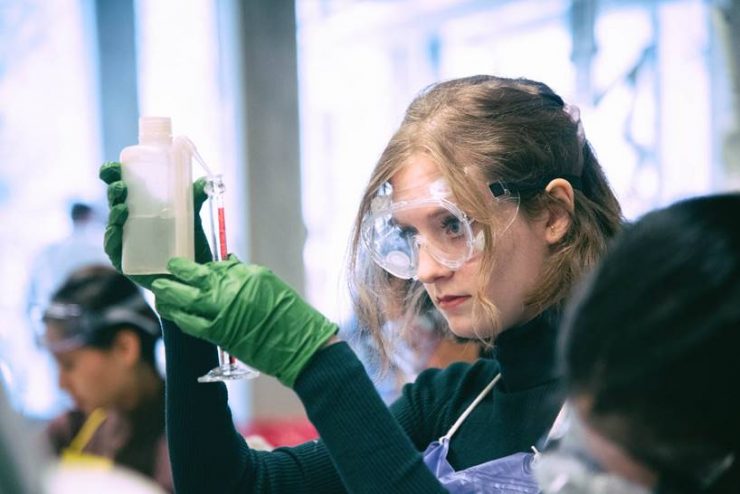
Discover the How-To of What's New
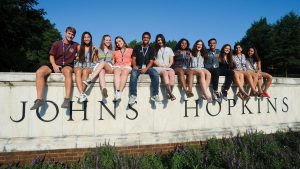
Make your Summer at Hopkins a Success!
Sign-up now to learn how you can take your education to the next level through our Pre-College Programs or Undergraduate Courses.
Audience Menu
Celebrating 150 years of Harvard Summer School. Learn about our history.
Study Psychology and Neuroscience at Harvard

The application for Summer 2024 is closed.
What You’ll Learn
Curious about what makes people tick? This summer, uncover the mysteries of the mind. Learn about the anatomy and function of the brain or the psychological motivations behind human behavior. You can also learn about the intersection between psychology, logic, and the law.
The 7-week Secondary School Program allows you to take two courses instead of one, so you can use your summer to focus your studies on topics you are excited about or evaluate a potential field of study in college. Explore these Psychology and Neuroscience subjects you can study at Harvard and design your own psychology and neuroscience summer program by choosing two courses.
Featured 7-Week SSP Courses
Brain science.
- Neurobiology (BIOS S-50)
- Neuroinvesting: Neuroscience and Financial Decision-Making (ECON S-1915)
- The Neuroscience of Learning (PSYC S-1609)
Individual and Social Psychology
- Introduction to Psychology (PSYC S-1)
- The Psychology of Eating (PSYC S-1470)
- The Psychology of Close Relationships (PSYC 1503)
- Explaining Beauty: The Hidden Functions Behind Aesthetics (PSYC S-1812)
Psychology, Logic, and Law
- Deductive Logic (PHIL S-12)
- Power and Privilege in the Criminal Justice System (PSYC S-1872)
Explore More Psychology and Neuroscience Courses
Interested in finding more courses like this? Browse our course catalog to see all of our psychology and neuroscience courses.
High school students interested in taking justice, ethics, and human rights courses must first apply and be accepted into the Secondary School Program . These courses are also open to adult and college students over the summer. Adults and college students should complete these steps to register .
How long are the Psychology and Neuroscience classes?
These courses run the full length of the 7-week term. 4-credit courses are in session 2 days/week and 8-credit courses are in session 5 days/week (Monday-Friday). On class days, you will meet for 3 hours.
Do I earn college credit from these courses?
Yes. At the completion of the program, you may request a transcript listing your coursework, grades, and number of credits earned. Students participating in the 7-Week Residential program earn 8 credit hours, either taking two 4-credit courses or one 8-hour course, while SSP Online or Commuting students may choose to take either 4 or 8 credit hours during the 7-week summer session.
Are these classes online or in-person?
Some courses are available on-campus only, while others are available in a flexible format for 7-week SSP Online or Commuting students. Learn more about which courses are available depending on your program format.
Are my college credits transferable?
Harvard Summer School credits are accepted toward degrees at most colleges and universities at the discretion of the home institution. You can request a copy of your transcript after completing your courses. Because degree requirements vary among schools, you should check your home school’s transfer policies before you register.
Harvard Division of Continuing Education
The Division of Continuing Education (DCE) at Harvard University is dedicated to bringing rigorous academics and innovative teaching capabilities to those seeking to improve their lives through education. We make Harvard education accessible to lifelong learners from high school to retirement.

Top 20 Psychology Summer Research Opportunities for High School Students

By Jin Chow
Co-founder of Polygence, Forbes 30 Under 30 for Education
10 minute read
Psychology touches every aspect of human life. Whether you want to be a counselor or just better understand how humans make choices, psychology may be the field for you! This field explores the mind and how it affects social interactions, society itself, and individual health and happiness.
Our top 20 Psychology Summer Research Opportunities for High Schoolers were ranked based on their:
Affordability (paid internships and free programs score above expensive programs)
Name recognition or prestige
Academic rigor
Social opportunities
Time commitment (longer programs score higher)
If you’re searching for a virtual psychology research opportunity, consider doing a project through Polygence with one of our psychology mentors .
Exploring the Mind just Light You Up?
Polygence pairs you with an expert mentor in your area of passion. Together, you work to create a high quality research project that is uniquely your own. And on your own schedule. Our psychology mentors both inspire and guide you along the way. We also offer options to explore multiple topics, or to showcase your final product!
Psychology Summer Programs for Teens
20. cognitive psychology: how the brain works .
Hosting institution: William & Mary
Format: Online
Application deadline: None
This is a very flexible program in terms of scheduling, and it requires no transcripts or letters of recommendation. It's very broad in its scope and takes you from the origins of psychology to its role in robotics today. You'll also study brain anatomy and physiology. Other subjects include positive thinking, memory, decision-making, and cognitive psychology in the fields of health care, law, and education.
19. Pre-College Summer Session
Hosting institution: Carnegie Mellon
Cost: $6,282-$12,454
Format: In-person (Pittsburgh, PA)
Application deadline: March 15th
Get an authentic college experience with this 6-week program that lets high schoolers take undergrad classes from college faculty on the Carnegie Mellon campus and earn college credit. The courses offered vary from year to year, but there is always at least an intro to psychology and a neuroscience class. The cost of the program varies, depending on the number of classes you take and whether you decide to commute in or stay on campus in the dorms.
18. Camp Psych
Hosting institution: Gettysburg College
Cost: TBD; the program was on hiatus in 2023 and will return in 2024
Format: In-person (Gettysburg, PA)
Application deadline: Rolling admissions
If you’re curious about psychology but not yet ready to commit your entire summer to it, this is a great starter program. This camp is geared toward introducing you to some of the major questions addressed by psychologists, a view into the profession, and then a foray into psychological research methods and hands-on experience applying new skills to real-world issues.
17. Summer Sessions
Hosting institution: UCLA
Cost: $821-$1,541
Format: In-person (Los Angeles, CA)
Application deadline: February 15th
UCLA Summer Courses gives you the opportunity to take college-level psych classes in person or hybrid (i.e., combination of in person and online). Courses you can take at UCLA as a high school student include: PSYCH 10: Introductory Psychology; PSYCH 15: Introductory Psychobiology; and PSYCH 85: Introduction to Cognitive Science. Your cost depends on how many courses you decide to take. California high school students may be eligible for full or partial scholarships.
16. Psychology & Neuroscience at Yale
Hosting institution: Summer Springboard
Cost: $3,098-$5,898
Format: In-person (New Haven, CT)
This hands-on program is a blend of psychology and neuroscience topics. You'll visit the Cushing Center at Yale , named after Harvey Cushing, the father of neurosurgery. As your final project, you will propose your own psychology theory, run an experiment to test it, and give a presentation about your findings to the class. You can commute in or stay on campus. Your cost varies on whether you commute or board on-campus.
15. Psychology Institute
Hosting institution: Wake Forest University
Cost: $3,000
Format: In-person (Winston-Salem, NC)
In this deep-dive of a program, you’ll explore the structure of the brain through hands-on dissection. You’ll learn how illusions, emotions, and biases affect how humans see and interact with the world. Finally, you’ll team up and conduct your own observational study and present your research findings. We love how rigorous this program is and how it gives students access to world-class faculty, researchers, and industry professionals. Spring sessions lasting from 1 to 4 weeks are also offered.
14. Experimental Psychology
Hosting institution: Oxford Royale
Cost: £5995 (~$7,572 USD)
Format: In-person (Oxford, UK)
Ever wanted to attend the legendary University of Oxford? This program gives you that experience while helping you explore the mind’s inner workings. In addition to studying fundamental psychological concepts, you will debate compelling and controversial issues with fellow students from all over the world. Small class sizes and seminars with world-class guest speakers also make this a compelling program. Despite the prestige of the organization and the many social opportunities, we rated it a bit lower based on the higher price.
13. Introduction to Psychology
Hosting institution: Cornell University
Cost: $5,040
Why don’t psychopaths feel guilty when they harm others? How reliable are childhood memories? Why do we laugh? Do violent video games make people act violently? This online, synchronous/live 6-week course will use the science of psychology to explore these and other existential questions. You can earn up to 3 college credits by completing this immersive course - and still keep your afternoons free for other activities.
12. Pre-College Accelerated Online Semester: Social Psychology
Hosting institution: Syracuse University
Application deadline: Rolling basis
This 8-week online, pre-college course is an introduction to social psychology and its experimental approach. While they currently only offer Fall/Spring courses, students attend classes and explore research on topics such as social influence, conformity, social perception, attitude changes, small groups, and collective behavior.
11. EXPLO Psychology + Neuroscience
Hosting institution: Wellesley College
Cost: $7,350
Format: In-person (Norwood, MA)
During this program’s 3-week summer session, you will explore the crossroads of psychology and neuroscience in an attempt to understand and unlock the mysteries of the human brain. Activities include brain dissection, diagnosing mental illness, and analyzing neurochemical reactions.
Start exploring your favorite aspects of Psychology now!
Register to get paired with one of our expert mentors and to get started on exploring your passion for psychology today!
10. Social Psychology and the Law
Hosting institution: Duke
Cost: $3,200-$4,900
Format: In-person (Durham, NC)
Application deadline: May 1st
Those most interested in social psychology might prefer this 2-week option. Psychology and how it impacts (and is impacted by) the law are the subjects you will explore. Some subjects include eyewitness testimony, interrogation, and confessions. You'll also collaborate on a research project with fellow students and deliver a final presentation. The cost depends on whether you decide to commute or board on-campus.
9. Psychology Summer Program
Hosting institution: Illinois Tech
Cost: $595-$1,395
Format: In-person (Chicago, IL)
Application deadline: March 1st
This program shines a light on the participants' understanding of themselves, while providing an idea of what it is to be a therapist. During the week, you’ll explore five different topics each day: a general introduction, multicultural psychology, psychology research and technology, psychotherapy, and careers. The cost of the program varies on whether you commute or decide to board on-campus.
8. Summer Challenge
Hosting institution: Boston University
Cost: $4,550
Format: In-person (Boston, MA), with limited remote options through Summer Challenge Online
Explore the subject(s) you love in-depth without worrying about grades. This 2-week interdisciplinary program offers seminars ranging from Abnormal Psychology to Persuasive Writing. You can choose two non-credit seminars (one in the morning, one in the afternoon). You’ll participate in lectures, discussions, individual and group work, project-based assignments, and field trips. Each seminar concludes with a final class presentation.
7. Psychology and Its Impact on Everyday Life
Hosting institution: Georgetown University
Cost: $1,495
Format: Online
Application deadline: April 1st
Need lots of flexibility? This program lets you work a 1-week, 2-week, or 4-week intensive psychology class into your own schedule. It covers social media's effects on the brain, the influence of perception, how the brain works, insight into learning and memory, possible psychology careers , and more. You will complete and present a final product at the end of your session.
6. Psychology and Brain Sciences Pre-College Program
Hosting institution: Johns Hopkins University
Cost: $4,711-$6,063
Format: In-person (Baltimore, MD)
This 2-week session offers a fast-paced college-level learning experience, a chance to learn from Hopkins’ world-renowned instructors, and a peer group of academically oriented students from around the globe. Use this summer course to broaden your knowledge, enhance your college application, and earn college credit. Cost varies depending on whether you want to commute or board on campus.
5. NSLC on Psychology & Neuroscience
Hosting institution: National Student Leadership Conference (NSLC)
Cost: $3,895
Format: In-person (Durham, NC; Washington, DC; or San Francisco, CA)
This very hands-on, 9-day program helps you explore the relationships between the brain and human behavior. You'll dissect brain tissue and learn to identify abnormal findings. You'll do clinical diagnostic simulations and humor behavior workshops, go on field trips to nearby medical facilities, and learn from esteemed guest speakers within the psychology and neuroscience communities.
4. Summer Scholars Program
Hosting institution: University of Notre Dame
Cost: $4,475
Format: In-person (Notre Dame, IN)
Application deadline: March 18th
This 2-week residential program gives you a taste of what taking a psychology course in college will be like. You'll attend a mix of lectures and discussion seminars, and your reading list will include works on social psychology and philosophical tools. Students can earn one transferable college credit upon the completion of their program.
3. Summer@Brown
Hosting institution: Brown University
Cost: $3,000-$6,000
Format: Online or In-person (Providence, RI)
Application deadline: May 12th
You have a lot of options here. Courses range from 1-7 weeks, and you can take them online or in person. Offerings include a variety of study areas, from "Radical Social Movements of the Late 20th Century" to "Food, Identity, and Place", to "Reading Psychoanalysis in American Film & Fiction", and more. If you’re staying on campus, you’ll have the opportunity to participate in additional workshops, activities, and group events.
2. Recruitment & Training for Under-Represented Populations (RTURP) Program
Hosting institution: Johns Hopkins Bayview Campus
Cost: Full-time, paid position
Application deadline: February 1st
This program specializes in the psychology of addiction. And not only is this an immersive 10-week learning experience. It is also a paid summer full-time job. In this highly competitive psychology program, participants will work side-by-side with some of the leading scientists in the world at the National Institute of Drug Abuse (NIDA), the primary source of scientific knowledge concerning addiction for nearly 60 years. Students from economically disadvantaged backgrounds are encouraged to apply.
1. SHTEM: Summer Internships for High Schoolers
Hosting institution: Stanford
Cost: Unpaid internship
Format: Online or in-person (Stanford, CA)
SHTEM includes: Science; Humanities; Technology; Engineering; and Mathematics. In this 8-week internship, you work on interdisciplinary projects directly with Stanford faculty and graduate students. Past multifaceted projects have incorporated themes from psychology, neuroscience, design, linguistics, technology, and more. This is an unpaid internship and you will be expected to work anywhere from 30 to 40 hours per week. You will work directly with a mentor once you have been assigned a project.

Other Research Opportunities for High School Students
In addition to this list of psychology research opportunities, there are many more available that you can pursue, either in a formal psychology study program or in another subject area that interests you. Here are a some Polygence resources to check out:
Research programs created for high school students
Summer internships opportunities for high school students
Ideas for passion projects you can undertake independently
How to start writing your own research paper
At Polygence, we offer students the opportunity to get 1:1 project mentorship from expert mentors and researchers. Students are in the driver’s seat of their education here, and whatever project you want to do, we will help you make it happen!
Do Your Own Research Through Polygence
Your passion can be your college admissions edge! Polygence provides high schoolers a personalized, flexible research experience proven to boost your admission odds. Get matched to a mentor now!"

- Recommendations
- Notifications
- My Favorites
Favorites, recommendations, and notifications are only available for UCLA Graduate Students at this time.
Access features exclusively for UCLA students and staff.
As a student, you can:
- Add funding awards to your favorites list
- Get notified of upcoming deadlines and events
- Receive personalized recommendations for funding awards
We're Sorry
You've signed in with a UCLA undergraduate student account.
UCLA Graduate Programs

Summer Programs for Undergraduate Research (SPUR)
Program purpose.
The UCLA Summer Programs for Undergraduate Research (SPUR) offer upper division undergraduate students with outstanding academic potential the opportunity to work closely with faculty mentors on research projects. The programs are designed for students who wish to learn more about the graduate school experience and possibly pursue an academic career in teaching and research. Opportunities are available in virtually all academic fields (e.g., arts, humanities, social sciences, life sciences, health sciences, physical sciences, etc.).
Student participants in many SPUR programs will work with a faculty mentor with special expertise and interests matched, as closely as possible, to the student’s research interests and career goals. Most, but not all, SPUR programs pair students with a faculty mentor. Students will either assist the faculty member in an ongoing research project or work collaboratively with the mentor in designing a new project of mutual interest.
Most SPUR programs feature seminars on:
- writing and research skills
- strategies for enhancing success in applying to graduate school
- graduate school funding opportunities
- opportunities for informal discussion with UCLA graduate students
- academic career opportunities
- cultural and educational activities
For further details about specific programs, please refer to the UCLA Summer Programs for Undergraduate and Graduate Research Booklet .
As a condition of acceptance into the program, program participants will be asked after their departure to update information on their educational and career activities. This tracking is done solely to evaluate the effectiveness of the program. It is critical that we be able to conduct this long-term evaluation in order to maintain continuing funding for the programs. The information collected remains strictly confidential.
Please check with your respective summer program of interest about whether it will be conducted remotely or in-person.
2024 Program Dates
Most programs run eight weeks, from June 2024 to August 2024. Some programs in the sciences, technological, engineering and mathematics fields run 10 weeks, from June 2024 to September 2024. One program in the humanities and social sciences runs six weeks, from June 2024 to August 2024.
The tentative dates for SPUR 2024 are June 23 to August 17 (8-week programs) and June 23 to August 30 (10-week programs).
All application materials and supporting documents must be received by March 31, 2024 unless otherwise stated in the program description. Preference will be given to applications that are completed by the program’s deadline. Notification of decisions will be made by the end of May 2024. Please contact the individual program coordinators for questions regarding the application and application deadline.
Programs interested in being added to the those included in SPUR (or those on hiatus and seeking to resume inclusion) must reach out to RaShawna Williams, SPUR Program Representative, at [email protected] by March 31, 2024. We do our best to include all requests, but cannot guarantee participation.
Participating Programs
There are multiple programs participating with UCLA SPUR. Below are brief summaries of each program. The summaries include the specific program components, eligibility requirements and length of the summer program. Please view the chart of participating summer programs at UCLA for a quick reference of programs and their related academic fields.
Please click on the links to learn about each program. You will be able to apply to a maximum of two (first choice and second choice) in our online application.
Amgen Scholars Program
Application Deadline: February 1, 2024
The Amgen Scholars Program is a national program to increase learning and networking opportunities for students committed to pursuing a career in science or engineering. Students interested in summer research in any area of biomedical science, chemistry, bioengineering or chemical engineering are encouraged to apply. Students will be paired with a UCLA faculty mentor if the student does not already have one. Program typically includes stipend; housing; meals; 2-day biotechnology in Los Angeles; luncheons with faculty; workshops; seminars and poster presentations.
- For undergraduates enrolled in four-year colleges and universities in the U.S., Puerto Rico and other U.S. territories.
- For sophomores (with 4 quarters or 3 semesters of college experience), juniors and non-graduating seniors (who are returning in the fall to continue their undergraduate experience).
- Must have a cumulative G.P.A. of 3.2 or above.
- Must be interested in pursuing a Ph.D. or M.D./Ph.D.
- 10 weeks (all participants must be able to attend the program for its entire duration. Be sure to check your fall term start date before applying).
- If you have questions, please contact Kim Mendez at [email protected].
Bioscience Scholars Program
Application Deadline: TBD
The Bioscience Scholars Program (formerly known as SPUR LABS) provides a rigorous eight or ten-week research training experience for undergraduates with interests in a broad range of bioscience disciplines– —from molecules to organisms and from basic to translational science. Exceptional research training, integrated with professional development activities, will prepare students to succeed in leading Ph.D. and M.D./Ph.D. programs. The program aims to contribute to diversity, inclusion, and the elimination of barriers to participation in bioscience research careers and is designed for students participating in honors research programs that foster transition to doctoral programs (e.g., Minority Access to Research Careers, MARC). Participants receive a stipend & food allowance of $4,000 for 8 weeks or $5,000 for 10 weeks. Participants will be matched with an appropriate faculty member based on research interests. There are over 400 faculty mentors in ten bioscience research areas.
A complete application includes the submission of the online application form as well as all supplementary materials, including two letters of recommendation and a personal statement that describes your bioscience research interests and any research experience, including how these interests and experiences have shaped your personal and professional goals, and how Bioscience Scholars Program would help you meet these goals. See Bioscience Scholars Program website for full details of supplementary application materials.
Selection criteria: academic preparation and achievement; leadership potential; relevance of research interests and experience; potential for the program to help the applicant achieve his/her career goals; and potential to contribute to the diversity and excellence of the bioscience research enterprise.
- U.S. citizen, U.S. permanent resident, or AB 540
- Prior to beginning the program, completion of at least two years of undergraduate study
- Participants may not be UCLA students; UCLA students should consider other summer research opportunities such as CARE SEM or Amgen Scholars
- Minimum cumulative G.P.A. of 3.0
- Intention to pursue a Ph.D. or M.D./Ph.D. in a bioscience field and not admitted or enrolled in a graduate program (M.S. or Ph.D.) at the time the program begins
For additional information see Bioscience Scholars Program website or contact the Program Directors, Drs. Gregory Payne and Diana Azurdia at [email protected] .
B.I.G. Summer (Bruins In Genomics) 8-week Summer Research Program for Masters and Undergraduate Students
Application Deadline: March 1, 2024
Bruins-in-Genomics (B.I.G. Summer) is an 8-week full-time immersion program for undergraduates interested in learning how to read and analyze genes and genomes. Through this program students will have the opportunity to experience graduate-level coursework, and learn the latest cutting-edge research, tools and methods used by leading scientists to solve real-world problems.
Applicants must be:
- A U.S. citizen, permanent resident, or F-1 visa holder
- Be a rising junior or senior
- have a GPA of 3.0 or higher
- have some familiarity with at least one programming language (e.g. python, pearl, R, Java, MAT-LAB, C++, etc.); preferably have taken bioinformatics or biostatistics courses
Students interested in applying should only do so here.
For more information:
Email: [email protected]
Brain Research Institute Summer Undergraduate Research Experience (BRI-SURE)
The UCLA Brain Research Institute (BRI) sponsors a summer undergraduate research experience (BRI-SURE) pathway program for students currently participating in the Minority Access to Research Careers (MARC) and other honors research programs whose goal is to increase diversity. This program solicits applications from students from universities and colleges across the nation. BRI-SURE Pathway is an 8-week, intensive summer research-training program for exceptional students interested in pursuing research careers in Neuroscience or Physiology. The program is designed to provide a rigorous, in-depth research experience to prepare participants for top-quality Ph.D. and M.D./Ph.D. graduate programs. The BRI-SURE residential program offers a summer stipend. The BRI-SURE non-residential program does not offer a summer stipend. Although we anticipate an on-campus summer experience, we may have to resort to an online-only Summer Research Experience for 2022.
- Applicants must be in good academic standing with a minimum GPA of 3.0;
- Applicants must submit the following: 1) UCLA SPUR Online application form, 2) Academic transcript, 3) Personal statement (limit to 1000 words) that describes your past, present or future leadership in and commitment to research and diversity in science, 4) Summary of prior research, if any (limit to 1000 words), 5) Two letters of recommendation from science faculty, and 6) Paragraph (500 words or less) summarizing your interest in neuroscience or physiology;
- In a separate file, applicants need to rank in order of preference, the top three research training areas: Neuroendocrinology, Sex Differences, and Reproduction; Neural Repair; Neural Microcircuits; Neurobehavioral Genetics; Molecular and Cellular Neurobiology; or Molecular, Cellular and Integrative Physiology;
- Submit additional application materials directly to [email protected]
To learn more about how to apply to this program, please contact Dr. Gina Poe (Program Director) at [email protected]
California State University (CSU) Sally Casanova Pre-Doctoral Scholars Program
Application Deadline: Contact the program representative for your campus’ CSU Sally Casanova Pre-Doctoral Scholars Program
This program is restricted to undergraduate and master’s-level students in the California State University Sally Casanova Pre-Doctoral Program. The Program is designed to increase the pool of potential university faculty by supporting the doctoral aspirations of CSU students who have experienced economic and educational disadvantages. Each of the selected CSU Sally Casanova pre-doctoral scholars works closely during the academic year with a CSU faculty sponsor to develop an overall plan leading ultimately to enrollment in a doctoral program. Each of these plans is tailored to specific goals and educational objectives of the student. The Program places special emphasis on increasing the number of CSU students who enter doctoral programs at one of the University of California institutions. Summer Program includes: stipend, on-campus housing or housing allowance, meal allowance, funds toward roundtrip transportation cost, GRE test preparation, workshops and oral presentations.
- Open to all current CSU Sally Casanova Pre-Doctoral Scholars, both graduate and undergraduate.
- 8 week program.
- CSU Scholars complete only the UCLA SPUR online application after they have approval from the UCLA SPUR Coordinator; do not submit supplemental materials.
- To become a CSU Sally Casanova Pre-Doctoral Scholar, please contact the program representative on your CSU campus.
Community College Field Biology Alliance
Application Deadline: February 16, 2024
This is an 8-month research internship designed for community college students. Student interns are assigned a graduate and undergraduate research mentor and meet remotely on the first Saturday of each month from May to June to design a field biology-based research project. In July we travel as a group to a remote field station for 7 days to enact the planned intern research projects. The program culminates with student research presentations in December.
Eligibility Requirements:
- Full-time community college student.
- Interest in environmental science, ecology, animal behavior, botany, and similar fields.
- Ability to attend all monthly meetings and field excursion (all expenses covered by the program).
For more information and to apply, please visit the Community College Field Biology Alliance website . If you have any questions, please email them Amanda Robin (Program Director) at [email protected].
Cultivating Interest in Research Careers (CIRC)
Application Deadline: March 18, 2024
The Cultivating Interest in Research Careers (CIRC) program is a partnership between University of California, Los Angeles (UCLA) and Charles R. Drew University of Medicine and Science (CDU). The program starts with a ten-week summer research program at UCLA, AND extends into a year-long continuum. The goal of CIRC is to provide community college students underrepresented in medicine and science (UIMS), such as African American, Latinx, Native American, Pacific Islander, disabled and socioeconomically disadvantaged students, with hands-on exposure and training in scientific research aligned with the scientific mission of the NHLBI.
The CIRC program will provide these community college students with educational workshops, near-peer mentoring, and skills to help them transfer to a 4-year college or university and ultimately be prepared to pursue a health profession or scientific research career.
- A current high school senior who has taken at least a semester of community college classes and plans on transferring to a community college in the Fall,
- OR Current community college student attending a community college in Los Angeles County (Must have at least a year of classes to complete before transferring to a four-year college or university) attending a community college in Los Angeles County
- Qualify as a student from an underrepresented group as defined by either A OR B:
A) Identify as a member of one of the following racial/ethnic groups:
- Black or African American
- Hispanic or Latinx
- American Indian or Alaska Native
- Native Hawaiian or other Pacific Islander
B) Have a disadvantaged family background, defined as either 1 OR 2 below :
- having been or currently being homeless, were or currently are in the foster care system, were eligible for the Federal Free and Reduced Lunch Program for two or more years, have/had no parents or legal guardians who completed a bachelor’s degree (e.g., “First-Generation”),
- were or currently are eligible for Federal Pell grants, received support from the Special Supplemental Nutrition Program for Women, Infants and Children coming from an educational environment such as that found in certain rural or inner-city environments that has demonstrably and directly inhibited the individual from obtaining the knowledge, skills, and abilities necessary to develop and participate in a research career.
C) US citizen or permanent resident
D) Have taken at least one college course in the general domains listed below and have composite grade point average of 3.2 or above in this coursework:
- Oral Communication
- Written Communication
- Critical Thinking
- Mathematics/Quantitative Reasoning.
- Must be able to attend the entire duration of the program.
To learn more information please visit the program website or email Humberto Sanchez, BA, Program manager CDU, [email protected] .
The Diversity Project
The Diversity Project is a 10-week* research-intensive summer program funded by the UC-HBCU initiative and the National Science Foundation focused on increasing participation of underrepresented minority students in marine and evolutionary biology. Through fieldwork and laboratory training, students will learn an integrative approach towards the study of the ecology and biodiversity of coral reef ecosystems at the Gump South Pacific Research Station on the island of Mo’orea, French Polynesia. TDP complements student-centered fieldwork and laboratory research with mentoring on career development, ranging from successfully applying to graduate school to choosing a career. TDP faculty also work with students to publish their research and to present their work at national and international meetings. Some funding dedicated to students from Hispanic Serving Institutions (HSIs) and Historically Black Colleges and Universities (HBCUs). *Note: This year’s program begins Monday, June 5, 2023.
Requirements:
- Current sophomore or junior standing, or non-graduating seniors
- Great attitude and willingness to learn SCUBA diving
To learn more information please see program website . To request The Diversity Project application, please contact Program Director, Dr. Paul Barber ( [email protected] ).
HBCU: Evolutionary Medicine – Pathways to PhDs
The HBCU: Evolutionary Medicine-Pathways to PhDs program is open to undergraduate juniors and seniors from HBCUs. Participants will work on Evolutionary Medicine topics at UCLA. Evolutionary Medicine is the study of how evolutionary and ecological principles affect medicine and medical applications, and how medical and clinical problems generate new research questions and ideas in evolution. Evolutionary medicine is fast emerging as an important new field in the biomedical sciences. Representing an interdisciplinary subject that combines ecology and evolutionary biology, anthropology, psychology, zoology, systems biology and microbiology with medicine, the field of evolutionary medicine has the potential to transform the way biomedical researches and doctors examine medical questions, conduct biomedical research, and treat patience. Summer interns will work closely with a principal investigator (PI) from UCLA’s Ecology and Evolutionary Biology Department and a PI from the David Geffen School of Medicine. Application requirements:
- Undergraduate juniors and seniors from HBCUs to work on Evolutionary Medicine topics at UCLA.
- Send all application materials to Dr. Pamela Yeh at [email protected]
Maximizing Access to Research Careers (MARC) U*STAR Program
The Maximizing Access to Research Careers (MARC) U*STAR Program is a two-year, NIH-funded, undergraduate honors program that seeks to increase the number of biomedical scientists from diverse backgrounds that significantly impact health-related research. The program specifically seeks to strengthen the skills and research training of students from groups traditionally underrepresented in the biomedical sciences. This program is appropriate for students interested in pursuing a PhD or dual PhD degree upon completion of their baccalaureate degree.
The MARC Program offers research training, financial support, mentoring, networking opportunities and academic preparation for strong and motivated students. The UCLA MARC program is one of the longest-standing MARC programs at Research I universities across the nation, and graduates from the program have embarked on highly successful careers.
- 3.2 GPA at the time of application; borderline GPAs also encouraged to apply
- Junior or senior standing (completed 90 or more units) by the time that the student will begin as a MARC trainee, AND have two years remaining at UCLA at the start of the program
- Citizen or permanent resident of the United States
To learn more about eligibility, program requirements, and scholarship/funding please refer to the MARC website . Additionally, the online application and other details about the application process will be hosted on the MARC website . For any additional questions, please contact Larone Ellison ( [email protected] ).
Mellon Mays Undergraduate Fellowship Writing and Research Training Program
Application deadline: March 15, 2024
*Deadline may be extended as needed.
The Mellon Mays Undergraduate Fellowship Writing and Research Training Program at UCLA is an intensive writing and research program for 20 current Mellon Mays Fellows from participating Mellon Mays colleges and universities. Fellows participate in a rigorous scholarly writing and research methodology course, individual and group mentoring sessions, workshops, events, and a final research colloquium. The program also includes on-campus housing and a meal allowance.
- Applicants must be current Mellon Mays Undergraduate Fellows at their colleges or universities
- For rising juniors (first-year MMUF students) or seniors (second-year MMUF students)
- Please note that students will NOT be paired directly with a faculty mentor but will take an intensive writing and research course. Students will NOT take a GRE preparation course as part of the program.
- Admission to the program is rolling; applicants are advised to apply early due to limited space. Applications will be considered after the deadline only if space is available.
- A complete application includes the submission of the online application form, as well as a brief research statement, a description of summer research goals, and a statement from the student’s MMUF coordinator. See the program website for full details of supplementary application materials.
To learn more about this program, please visit the program website or contact the Undergraduate Research Center– Humanities, Arts, and Social Sciences at [email protected] .
Summer Training for Excellence in Education Research (STEER)
Application Deadline: TBD
The Summer Training for Excellence in Education Research (STEER) program has been a successful staple of the Graduate School of Education and Information Studies (GSE&IS) at the University of California Los Angeles (UCLA). Through participation in the program, Historically Black College and University (HBCU) students and faculty, and GSE&IS faculty share in a research apprenticeship experience that has contributed to STEER students’ admittance to some of our nation’s finest graduate programs including the UC system. In the proposed effort, our aims are to continue to: (1) Develop relationships between the UCs and HBCUs, (2) Prepare students for UC graduate application, and (3) Prepare and mentor a cohort of tremendously talented students to conduct educational research in competitive UC programs and beyond.
All applicants must refer to the STEER website for the most up-to-date information regarding the application process. Additionally, the online application and other details about the application process will be hosted on the STEER website.
- Eligibility is extended to upperclassmen and recent undergraduates from Historically Black Colleges and Universities (HBCUs)
- Open to all disciplines, however training will be in Education research. Applicants are expected to be seriously interested in pursuing a Ph.D. in Education.
- Major GPA of 3.0
For additional information, see STEER program website or contact the Program Coordinator, Brande M.Otis, at [email protected] . The Program Co-Directors are Dr. Robert Cooper and Dr. Kimberley Gomez.
University of California Leadership Excellence through Advanced Degrees (UC LEADS) 2nd Summer
This program is restricted to current University of California undergraduate students in the UC system-wide UC LEADS Program. In line with the goals of the two-year program, the 2nd summer research program seeks to develop the students by providing research and educational experiences to further prepare them to assume positions of leadership in academia, industry, government and public service. UC LEADS students who are considering UCLA for graduate studies/PhD should seriously consider applying to UCLA’s summer program as a way to familiarize themselves with the campus and to network with potential mentors. The UCLA UC LEADS Summer Program includes: GRE test preparation, workshops and seminars, and the opportunity to present summer research findings at the end of summer symposium/poster session.
- Academic Level: Open to 2nd-Summer UC LEADS students (those from other UC campuses who have completed their first year in the program).
- Open to Depts/Disciplines: Open to all departments and disciplines in Science, Engineering & Math.
- It is the UC LEADS scholar’s responsibility to secure a commitment from the UCLA faculty host BEFORE applying to the program. Questions about the process should be addressed to the student’s UC CAMPUS UC LEADS Coordinator.
- UC LEADS Scholars complete only the UCLA SPUR online application after they have summer placement confirmation from the UCLA UC LEADS Coordinator. Scholars do NOT need to submit supplemental materials with their applications.
UCLA-HSI Superior Opportunities for Maximizing Access to Neuroscience (SOMA)
The SOMA-Neuroscience program supports a deeper Hispanic/LatinX participation in neuroscience, and ultimately the pursuit of a neuroscience doctoral degree. Each summer, we will select and invite a small group of interested students (3-7 students annually) from our partner Hispanic-Serving Institutions, or HSIs, for an 8-week summer immersive, in-person experience at UCLA to do research in a host laboratory. Open to undergraduate students.
The requirements for acceptance into the program include:
- Must be student at a Hispanic-Serving Institution (HSI) institution.
- A major in one of the natural sciences, including Psychology
- A minimum GPA of 3.0
- Academic transcript
- Curriculum Vitae
- Two letters of recommendation from science faculty
- Summary of prior research, if any (500 words or less)
- Summary of interest in neuroscience (1000 words or less)
To learn more about this program please visit the website or contact the program director, Dr. Alicia Izquierdo ( [email protected] ) and Larone Ellison ( [email protected] ).
UCLA-HBCU Neuroscience Pathways Program
The UCLA-HBCU Neuroscience Pathways program is open to undergraduate students that attend historically black colleges and universities (HBCUs) in the United States. The goals of this program are: 1) to increase the impact on students and faculty at both HBCU partner institutions and UCLA and, 2) to incentivize quality mentorship of the interns in our UCLA host labs. We will engage in active research and teaching partnerships that accompany students before and beyond the 8-week internship at UCLA.
A group of interested students, selected jointly by the HBCU partner institutions and UCLA will be invited to spend 8 weeks at UCLA doing research in an appropriate host laboratory. Ideally, the research at UCLA will be commensurate with the experience at the HBCU partner institution. We will engage in active research and teaching partnerships that accompany students before and beyond the 8-week internship at UCLA of mentorship in the lab. Interns will be mentored and trained by the faculty members who run the respective labs. Additionally, we will host one “chaperone” HBCU faculty member per year to accompany the student for the first week of the internship- which is intended to foster both scientific collaboration and quality mentoring. To incentivize graduate studies at UCLA for HBCU interns, the BRI will offer a full 5-year stipend annually for at least one student, annually, who applies for and is accepted by the NSIDP. Furthermore, we will conduct outcome studies and publish them in a peer-reviewed journal, similar to other BRI outreach efforts. In short, we will take an innovative and holistic approach by providing not only a summer opportunity but by following the student before and after through online tools.
- 8-week program
- Applicants must submit the following: 1) UCLA SPUR Online application form, 2) letters of intent
- Letters of Intent due by December 14, 2022. Please send to Larone Ellison ( [email protected] ).
- If you will have a delay with any supplemental application material, contact Dr. Ketema Paul or Larone Ellison and inform them of the delay.
- To learn more about this program, please contact Dr. Ketema Paul ( [email protected] ) or Larone Ellison ( [email protected] ).
UCLA Neuroscience Scholars Program (NeuroScholars)
The UCLA Neuroscience Scholars program is a 10-week intensive summer research training experience for exceptional UCLA sophomore and junior undergraduates that are committed to pursuing a graduate degree in neuroscience. Neuroscience Scholars will be paired with a UCLA faculty mentor based on their research interests. Students will conduct discovery research in the laboratories of their faculty mentors. The program also includes: on-campus housing, $5000 stipend, journal clubs, lunches with faculty, career development workshops, seminars, and poster presentations.
- For sophomore and junior undergraduates in Neuroscience, Physiological Sciences, Psychobiology and other neurobiology-related fields.
- Must have a cumulative G.P.A. of 3.2 or above
- Must be able to devote full-time effort over the entire duration of the 10 week program
- Previous research experience is preferred
- Applicants must submit must submit 1) UCLA SPUR online application, 2) personal statement summarizing your neuroscience research interests (limit 1000 words), 3) list of 3-5 neuroscience faculty mentors that you would like to work with, 3) summary of prior research, if any (limit 1000 words), 4) two letters of recommendation from science faculty, 5) resume/CV, 6) academic transcript
To learn more about this program, please contact Program Directors Dr. Jeff Donlea & Dr. Elaine Hsiao; [email protected]
UCLA Public Health Scholars Training Program
Application deadline: January 31, 2o24
*Applications for summer 2024 cohort open November 1, 2024 and close January 31, 2024.
The UCLA Public Health Scholars Training Program provides undergraduate students the opportunity to explore the field of public health through hands-on training, structured workshops, group excursions, and leadership and professional development. Located in Los Angeles, the program offers scholars the opportunity to train at UCLA, to explore public health in one of the most diverse counties in the US, and to experience the city’s vibrant culture. We work with community The UCLA Public Health Scholars Training Program provides undergraduate students the opportunity to explore the field of public health through hands-on training, structured workshops, group excursions, and leadership and professional development. Located in Los Angeles, the program offers scholars the opportunity to train at UCLA, to explore public health in one of the most diverse counties in the US, and to experience the city’s vibrant culture. We work with community-based organizations, health systems, and government agencies to offer field placement opportunities for scholars that focus on health equity.
- Must be a U.S. citizen, national, or resident (DACA recipients eligible) Must attend an institution in the U.S. or in a US territory.
- Must be authorized to work in the U.S. Must possess an interest in exploring a career in the field of public health by the start of the program
- Applicants must be: Community college graduates or transfers to four-year institutions OR In a four-year institution and have completed at least two years of undergraduate education (regardless of credit standing) by the start of the program OR Recent college graduates (Fall or Winter 2024 or Spring 2024) who have not enrolled in a graduate program by the start of the program.
- Interest in exploring a career in the field of public health
- Open to all majors/disciplines
- Ability to be present in LA and participate in program activities from June 21 – August 14, 2024
- Willingness to attend social and volunteer events on evenings and occasional weekends
- Willingness to stay engaged with program for alumni tracking, professional development opportunities, maintaining contact with cohort, and participate in recruitment for the 2025 cohort
- Successful submission of all application materials
- There is no GPA requirement
Additional criteria outlined in the application and website. For questions, please contact [email protected] .
Diversity in Vision Science Undergraduate Summer Research Program
Application deadline: April 15, 2024
This research experience is a full-time, 8-week immersive research experience in vision science at the Stein Eye Institute, University of California Los Angeles (UCLA). This program is designed to increase the diversity of undergraduates in vision science through dedicated faculty mentorship, hands-on research training/interactive learning, and career development opportunities. The program is open to undergraduate students with disadvantages backgrounds in the Greater Los Angeles Area in 2024.
Students will have the opportunity to learn and work on an original research project in laboratories with research focuses including but not limited to:
1. Understanding of vision and ophthalmology research and their importance in advancing the understanding of the visual pathways, developing novel therapeutic in various eye diseases, including glaucoma, degenerative retinal disorders, and corneal diseases.
2. Understanding the use of various state of art technology in stem cell biology and regenerative medicine in ophthalmology.
Students learn how to be a scientist in weekly lab meetings and will have the opportunity to present their findings at a UCLA scientific poster session as well as at their home institution. Additionally, students will engage in social activities and career development workshops with other summer research students on UCLA campus, thereby expanding their science community and faculty/peer network.
- Express an intention to pursue a Ph.D. or M.D./Ph.D. (or other professional joint degree) in a bioscience field.
- Should not admitted or enrolled in a graduate program (M.S. or Ph.D.) at the time the program begins.
- Minimum cumulative G.P.A. of 3.0. preferred
- Reside in the Los Angeles area.
To apply to the program, please send the following to [email protected] :
- Transcript (unofficial is acceptable)
- Personal statement: up to 1 page providing your interests in vision research and how your participation can add to diversity to vision research.
- Two brief letters of support (Professors can send these directly to [email protected]).
For questions or additional information, please contact [email protected].
For Further Information Contact
Please contact the Program Director of the individual summer program. Contact information for each of the SPUR programs can be found in the program description.
You may also contact the Diversity, Inclusion, and Admissions office at [email protected] . You may also find program information in the UCLA Summer Programs for Undergraduate and Graduate Research Booklet .
How To Apply
You must submit an Online Application & Support Materials . Please make sure you submit a complete application by sending all pertinent supporting materials via mail or private carrier.
Additional Opportunities
Other Summer Programs for Undergraduate Research at UCLA.
Secondary Menu
Duke nsf summer reu program seeking applicants.
The Department of Psychology and Neuroscience at Duke University will offer our second fully-funded NSF Summer Research Experience for Undergraduates (REU) from May 11th to July 9th, 2021! This REU provides underrepresented students with the skills, socialization, connection, and continuity to begin developing a scholar-researcher identity. This REU offers a truly unique research experience using a combination of methodological approaches across the life-span and across areas of psychology: Developmental, Social, and Cognitive Neuroscience. During this REU, students will get hands-on experience conducting experimental and observational research in addition to individually-tailored academic writing and GRE preparation sessions. Students will participate in weekly lab meetings, small group meetings, and one-on-one sessions with their mentors in addition to meeting with other Duke undergraduates and faculty.
This REU is jointly led by three faculty members whose research covers many areas of psychology and neuroscience: Makeba Wilbourn (developmental psychology: culture and experience effects on language learning), Sarah Gaither (social psychology: identity and diversity), and Gregory Samanez-Larkin (human neuroscience: motivation and decision making). Students who are admitted into the program will join one of these primary labs but also participate in regular activities with all students in the program from across the three research groups.
This second session of this REU will occur during summer 2021 (May 11 – July 9; with a third summer REU in 2022). There are no costs associated with participating in this program. If we are able to meet in person, all travel expenses and campus housing will be provided. Students will receive a $6000 stipend for working full-time across the internship period. This REU is supported by a grant from the National Science Foundation (Award #1950651).
The application deadline is February 27th, 2021. More details and a link to the application are available on the website: https://sites.duke.edu/reupsychneuro/
- Academic year
- Diversity, Equity & Inclusion
- Climate Handbook
- P&N Team Resources
- Degree Requirements
- Practicum and Ongoing Research Projects in Psychology
- Research Participation Requirements for Psychology Courses
- Summer Vertical Integration Program (VIP)
- Psychology Courses
- Graduate School Advice
- Career Options
- Forms & Resources
- Global Education
- Trinity Ambassadors
- Co-requisite Requirement
- Neuroscience Courses
- Neuroscience: Undergraduate Research Opportunities
- Neuroscience Research Practicum & Laboratories
- Summer Neuroscience Program
- Research Independent Study in Neuroscience
- Graduation with Distinction
- Frequently Asked Questions
- Neuroscience Teaching Lab
- Student Spotlights
- Neuroscience Graduation 2024 Program
- Other Job Boards
- Student Organizations
- Clinical Psychology
- Cognition & the Brain
- Developmental Psychology
- Social Psychology
- Systems and Integrative Neuroscience
- Admitting Faculty
- Application FAQ
- Financial Support
- Teaching Opportunities
- Departmental Graduate Requirements
- MAP/Dissertation Committee Guidelines
- MAP/Oral Exam Guidelines/Timeline
- Dissertation and Final Examination Guidelines
- Awards for Current Students
- Teaching Resources
- Instructor/TA Guidelines
- Faculty Mentorship Vision Statement
- All Courses
- Psychology: Course Sequence
- Psychology: Methods Courses
- Neuroscience: Course Clusters
- Neuroscience: Courses By Category
- Primary Faculty
- Joint Graduate Training Faculty
- Instructional Faculty
- Secondary Faculty
- Graduate Students
- Postdocs, Affiliates, and Research Scientists
- Faculty Research Labs
- Research News Stories
- Child Studies
- Community Volunteers
- Charles Lafitte Foundation: Funding Support
- Meet Our Alumni
- For Current Students
- Assisting Duke Students
- Neuroscience Graduation 2023 Program
- Psychology Graduation 2023 Program
- Giving to the Department

Summer Undergraduate Internship Program (SUIP)
Welcome to suip.
The University of Pennsylvania Summer Undergraduate Internship Program is a 10-week intensive summer research opportunity for undergraduate students, especially those who embrace and reflect diversity in the broadest sense, interested in pursuing careers in scholarly research. Interns will be matched with a Principal Investigator (PI) based on shared research interests. Throughout their time at Penn, interns will work with PIs and other lab mentors to develop laboratory and research skills essential for future graduate school experiences. In addition to laboratory work, interns will participate in seminars that will enrich their understanding of science, participate in professional development workshops, graduate school preparation seminars, and have the opportunity to present at the SUIP Symposium. SUIP is designed for students who aim to pursue a PhD or an MD-PhD in biomedical studies.
Summer Program Dates
The 2024 program dates are Monday, June 3, 2024 to Friday, August 9, 2024 (tentative move-in dates: Saturday, June 1, 2024 and Sunday, June 2, 2024). Participants can expect to engage in lab and program activities for approximately 40 hours during the week.
Participants must commit to participating for the duration of the program dates.
Eligibility
Residency requirement: The program is open to U.S. citizens and permanent residents only. We cannot accept applications from international students who do not meet residency requirements at this time. Applicants must be enrolled in a four-year college for the fall semester after the program ends. Graduating seniors are not eligible to participate. Although it is not required for applicants to have prior research experience, preference is given to applicants who will have completed their sophomore or junior year. Students must be able to attend the full 10-week program. Individuals from under resourced backgrounds that have been historically excluded from the biomedical sciences including but not limited to first generation college students, socioeconomically disadvantaged, attend small liberal arts colleges and universities with limited research opportunities, live with a disability, and/or who bring diversity to biomedical sciences by reason of their culture, class, background, work and life experiences, skills and interests are encouraged to apply for the program.
Compensation
Each intern receives:
- a competitive stipend ($5,500)
- On-campus housing,
- meal plans, and
- transportation costs for one round trip to the University of Pennsylvania.
SUIP Affiliated Programs
SUIP-DAPPG (Diversity Action Plan in Genomics), SUIP-CCI (Center for Cell and Immunotherapies), and SUIP-CFAR (Center for AIDS Research) are affiliated programs with SUIP. Students are selected to the affiliated programs based on their research interests. Applicants do not need to complete a separate application to be considered for these programs. All compensation is the same as the general SUIP. Applicants who apply to an affiliate program will also be considered for the general SUIP program.
If you would like to be considered for an affiliate program, please indicate which one in your personal statement. If admitted into an affiliated program, students still will participate in all SUIP activities and will be offered additional research specific content and activities based on the affiliate group.
SUIP-DAPPG (Diversity Action Plan for Penn Genomics)
The aim of the Diversity Action Plan for PENN Genomics (DAPPG) program is to increase the number of underrepresented students choosing a career in genome sciences and genomic medicine by providing opportunity for hands-on genomics research. The program supports summer research internships and post-baccalaureate programs, designed to augment student’s training for application to professional degrees.
Faculty Contacts:
- Maja Bucan ( [email protected] )
- Junhyong Kim ( [email protected] )
SUIP-CCI (Center for Cell and Immunotherapies)
The Center for Cellular Immunotherapies hosts a Summer Undergraduate Internship Program in cancer and cellular immunotherapies. Participating laboratories have the general goal of understanding how the immune system interacts with cancer and developing interventions to improve anti-tumor immunity. This field of study represents an intersection of cancer biology, immunology, cellular and molecular biology, and bioengineering.
Faculty Contact: Avery Posey ( [email protected] )
SUIP-CFAR (Center for AIDS Research)
SUIP-CFAR (Center For AIDS Research) Scholars will engage in mentored HIV/AIDS research. Research topics include HIV basic/translational science, clinical/behavioral science, implementation science, and HIV prevention research. SUIP-CFAR scholars will learn key concepts in the biological, clinical, behavioral, and community-based AIDS research and will build their professional skills.
Faculty Contacts:
- Kelly Jordan-Sciutto ( [email protected] )
- Florence Momplaisir ( [email protected] )
Application & Admissions
Application & Admissions Process:
Applications for SUIP 2024 open on October 1st, 2023 via the Penn application. All applications are due on February 1st, 2024 by 11:59 pm Eastern Time. All components of the application, including letters of recommendation, must be received by the deadline. Incomplete applications or applications submitted after this deadline will not be considered.
Applicants who wish to apply through the Leadership Alliance, the application portal opened on November 1, 2023 and will close on February 1st, 2024 at 11:59PM.
Applicants can submit an application through Penn’s portal ( link ) or via the Leadership Alliance ( link ). Our holistic evaluation process considers all components of the application. The research & personal statement should describe your meaningful research experiences and career goals and be used to share how your personal history, identity, and experiences motivate your choice to pursue a PhD, and the challenges you have overcome to get to this point. The letters of recommendation should include at least one from a research mentor, preferably the most recent one. The community statement should describe how your personal perspectives will shape and be shaped by engagement with the Penn community.
Required Documents
- Completed online application form via Penn’s application ( link ), or via the Leadership Alliance ( link ). Applications are accepted through both platforms and are considered equally.
- Research & Personal Statement- A statement describing your interest in pursuing research, any meaningful research experiences you've had up to this point, your academic and career goals and that shares how your personal history, identity, and experiences motivate your choice to pursue a PhD, and the challenges you have overcome to get to this point.
- Community Statement- A statement describing how your personal perspectives will shape and be shaped by the engagement with the Penn community (150-200 words).
- Two letters of recommendation from academic faculty or advisors
- Most recent unofficial undergraduate transcript
Application Instructions
- SUIP applicants who apply through the Leadership Alliance should follow the instructions on the Leadership Alliance’s website ( link ).
- Create an account following the link .
- Begin the application with your personal information.
- You will be prompted to select which “graduate” program you are applying to.
- Select “Biomedical Graduate Studies, Perelman School of Medicine”
- Select “SUIP” and “Summer 2024”.
- In the “Recommendations” section, please provide the contact information for two (2) recommenders. An automated email will be sent to the email address(es) provided for recommenders to submit their letters. All recommendation letters are due by 2/1/24 at 11:59PM.
- Applicants will be asked to select a graduate group of interest. Applicants can refer to the Biomedical Graduate Studies page for more information about graduate groups ( link ).
- If applicants are interested in an affiliate program, applicants can indicate their choice in this section.
- Follow the remaining prompts.
Leadership Alliance
The University of Pennsylvania is part of the Leadership Alliance . We accept applications for SUIP that are submitted through the Leadership Alliance summer research program portal ( link ). We will consider all SUIP applications regardless of which application platform students use.
Research and Personal Statement
In a 2 page document (8.5”x11”) with a minimum of 0.5’ margins and at least 11 pt font, describe your academic interests and career goals. If you have had any research experiences, please describe them. State your specific scientific interests and any particular research areas or techniques you'd like to explore. We encourage applicants to share their lived experience to document their journey and story, which is valued and considered high priority for our reviewers. Please upload your statement with your application. Please upload your statement with your application.
Transcripts
Your transcript must include all semesters/terms attended at your primary institution. Please also include any study abroad transcripts. Unofficial transcripts will suffice.
Letters of Recommendation
Two letters of recommendation are required. Letters from academic faculty who know you personally and can comment on your academic abilities and your aptitude for research are highly encouraged. Requests for letters of recommendation will be sent through the application portal to the email that applicants provide.
SUIP Overview
Principal investigator (pi) matching.
Successful applicants will have the opportunity to preference mentors based on their research interests. SUIP interns' lab placements are determined with consideration for the mentor's availability and the student's interests.
Areas of Research
Mentors are drawn from a group of over 600 faculty associated with Biomedical Graduate Studies (BGS) at the University of Pennsylvania. The mentors we work with have a strong commitment to helping students and extensive experience mentoring, training, and teaching students, postdoctoral fellows, and staff.
Research areas available to SUIP students include:
- Biochemistry and Molecular Biophysics
- Cancer Biology
- Cell Biology and Physiology
- Developmental, Stem Cell, and Regenerative Biology
- Gene Therapy and Vaccines
- Genetics and Gene Regulation
- Microbiology, Virology, and Parasitology
- Epidemiology and Biostatistics
- Genomics and Computational Biology (These faculty are also involved in our DAPPG program)
- Neuroscience
- Pharmacology
IDEAL Research Fellows, who are current graduate students or postdoctoral fellows, will serve as mentors for summer interns. Fellows will lead programming, team building activities, and excursions to explore Philadelphia. Our Fellows are passionate about helping interns succeed and working towards the mission of diversifying STEM.
Seminar Series
SUIP sponsors the Summer Seminar Series, a sequence of talks about timely issues in biomedical sciences presented by distinguished Biomedical Graduate Studies faculty. The seminars provide interns with an opportunity to discover the breadth of research taking place at Penn and beyond.
Social Events
Interns enjoy a variety of events including concerts and performances, trips to local museums, visits to historical sites, and social events with current graduate students and program staff. The University of Pennsylvania has several summer programs and there are many free events on campus that are open to our interns. Philadelphia is a great city to visit, and an even better place to live.
- Skip to Main
Virtual Summer Research Program
- News and Awards
- Diversity, Equity, and Inclusion
- Department History
- Administration
- Faculty List
- Faculty Directory
- Doctoral Students
- Current Students
- M.A. in Psychology
- M.A. in Industrial & Organizational Psychology
- Ph.D. in Cognition & Perception
- Ph.D. in Social Psychology
- Global Ph.D.
- Program Requirements
- Honors in Psychology
- Study Abroad
- Research Opportunities
- Transfer Students
- Areas of Study
- Participate in Research
- Research Labs, Centers & Facilities
- Published Books by Faculty
- Social Psychology Events
- Cognition and Perception Events
- Psychology Faculty Meetings
- Developmental Psychology Events
- Open Lab Meetings
- Faculty Search
Every year, the Psychology Department hosts 5 days of virtual programming for underrepresented students, focused on skill building, professional development, research presentations, panels, and individualized mentoring.
- 2022 Program Information
- 2022 Application To apply to the program, please complete the application by11:59 pm Tuesday July 5, 2022.
Previous Years Programs
- 2021 Program information
- 2021 Application . To apply to the program, please complete the application by 11:59pm EDT July 7, 2021 .
- 2020 Program information

Political Empathy Lab (PEL) Assembles Summer Research Team to Meet Residents of Pennsylvania and Connect Across Political Difference
Political Empathy Lab (PEL), funded by the University of Pennsylvania’s Office of the Provost and rooted at the SNF Paideia Program, is pleased to announce its 10-week immersive traveling research experience which begins May 28 through August 2 led by Dr. Lia Howard, a political scientist serving as the Student Advising and Wellness Director of the SNF Paideia Program. Traveling from Philadelphia to Gettysburg, Lancaster to Erie and many towns in between, PEL seeks to explore the possibility of connecting across political difference through direct practice in Pennsylvania.
Publication
In the News

Polarization around political and social issues is galvanizing voters to protect one version of America against a different vision projected by the opposing party. Further, people have strong feelings about what the “story of America” is, has been, and should be. The 2024 election is thus shaping up to be another demonstration of the fractures among the American people and Pennsylvania, as a swing state, is poised to play a pivotal role in helping to determine the outcome of the Presidential election.
Political empathy asks that we apply empathetic skills to US politics, a realm that has not only been markedly polarized, it has reflected extreme disconnection between those who identify differently ideologically because they do not share information or space.
The summer of 2024 will be an interesting time to travel around Pennsylvania. PEL’s research provides an authentic opportunity to meet fellow residents of Pennsylvania face to face, acknowledging that we experience different lived realities and want to try to better understand each other. PEL will visit counties across the Commonwealth of Pennsylvania beyond the Philadelphia region through several mini trips. We hope to encounter Pennsylvanians who hold different socio-political views and engage them in conversation grounded in deep listening.
Dr. Howard says “The hope is that this experience will sharpen and awaken our intellectual humility and curiosity around ideologies and beliefs that differ from our own. An additional aspiration is that we might understand how place may connect to ideology as well as the role that super-ordinate identities may hold to our sense of belonging.” She adds, “This trip provides a variety of immersive opportunities to exercise our practices around dialogue.”
This research experience is deliberately not canvasing and not polling, though the team will work with Penn’s Public Opinion and Election Studies (PORES) team to inform their practices. PEL seeks to better understand fellow Pennsylvanians through better conversations with them.
The team will visit such sites as municipal buildings, main streets, museums, state fairs, union workers offices, the capital building, historical archives, a mushroom farm, prison, flood sites, and environmental and energy spots with wind turbines, and many others.
Why did PEL choose PA?
- -2024 is an Election year and Pennsylvania is a swing state
- -This would allow Penn students to encounter “the other side” of issues where there may appear to be consensus at Penn
- This would likewise allow folks in other communities in Pennsylvania to encounter Penn students with the aspiration of dispelling myths about so called “elites”
- -Pennsylvania has regional variation and both rural, suburban and urban counties providing an in-depth social and political analysis of one state
- -Pennsylvania is the state in which Penn is located. As an institution we often discuss our local identity as Philadelphians but less frequently our identity as Pennsylvanians
- This summer the public is invited to follow the project in a number of ways: through a dedicated podcast, The Park: Political Empathy Lab, with stories and interviews captured on the road; regular content added to the project’s website; and by activating tools and resources shared for conducting effective dialogue.
The PEL Research Team includes Penn students across a range of disciplines, from Political Science and Philosophy, Politics, and Economics, to Religious Studies, English and Classical Studies. They include:

Ashley Alexander is a sophomore from Westchester County, New York majoring in Philosophy, Politics, and Economics. Alexander is a student worker with the Center for Africana Studies, involved in the Diversity and Inclusion Strategic Consulting Club, and a member of The OAX Society. She sees PEL as a sanctuary for deep understanding and communication in the deeply polarized landscape of our political climate today. She hopes to gain a deeper understanding of people with varying political ideologies and foster a sense of inclusivity that accepts the ideas and perspectives of people from diverse backgrounds.
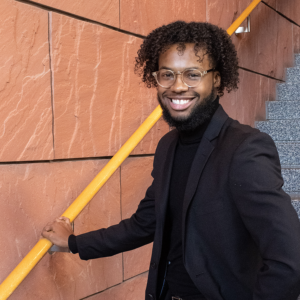
Hyniff Collins is a sophomore from Philadelphia, Pennsylvania majoring in Political Science and Religious Studies. Collins is a SNF Paideia Fellow and Ben Franklin Scholar. He hopes to go to seminary and divinity school after graduation to build a career as a professor of Christian history and Christian literature and work as a minister within the church. On campus, he writes for the Penn Epistle , the Christian journal on campus, and is a member of the Veritas Fellows and a Benjamin Franklin Scholar. As part of PEL he hopes to see what people all across the state believe and why, so that gaps can be overcome and connections made.
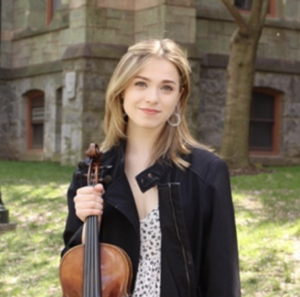
Autumn Cortright is a junior from Milwaukee, Wisconsin majoring in Philosophy, Politics, and Economics and Classical Studies. On campus, she serves as the Principal Viola of the Penn Symphony Orchestra, teaches music to Philadelphia elementary students with SPARKLES, researches the war in Ukraine with the European Studies Institute, and leads expeditions on the Appalachian Trail with PennQuest. She is looking forward to investigating the human side of politics this summer, and hopes to learn more about humanity itself while working with the PEL.
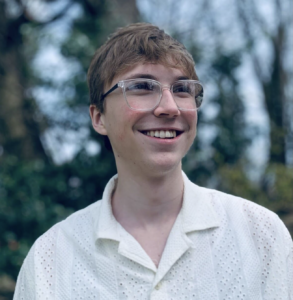
Noah Kocher is a freshman from Phoenixville, Pennsylvania majoring in English and Creative Writing. Kocher works as a content manager for The Penn Review and will be joining the class of 2027 SNF Paideia Fellows cohort. Through PEL, they hope to expand their capacity for empathetic dialogue and gain a better understanding of their home state.

Gyuha Lee is a senior majoring in political science and economics. He joined the PEL to study how Americans practice political empathy in real life, particularly during an election cycle. On campus, Gyuha is involved with the Penn Government and Politics Association, Penn Undergraduate Law Journal, and Penn Undergraduate Economics Society.
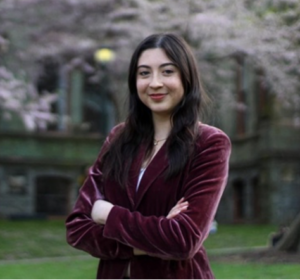
Natalie Vasquez is a sophomore from La Quinta, California double majoring in Political Science and Urban Studies. Vasquez is a SNF Paideia Fellow and Ben Franklin Scholar. She is fascinated by the notion that every individual she encounters possesses a life story that as intricate. This motivates her to listen attentively and comprehend their viewpoints, experiences, and struggles. For this reason, the mission of PEL to investigate how surroundings influence one’s beliefs and sense of belonging –and to foster meaningful discussions across socio-political disparities– aligns with her belief in the power of empathy and dialogue to bridge differences.

Dr. Lia Howard is a political scientist who specializes in American politics. Prior to joining the SNF Paideia Program, Lia Howard served as the executive director of the Philadelphia Commons Institute, a nonprofit organization dedicated to the practice of civic dialogue. She has taught at St. Joseph’s University, Villanova University, Eastern University, as well as at the University of Pennsylvania. She is a non-resident senior affiliate at the Program for Research on Religion and Urban Civil Society, a non-resident scholar at Baylor University’s Institute for Studies of Religion, and a senior fellow at the Robert A. Fox Leadership Program at Penn. Her research interests lie at the intersection of political culture, American political development, education policy, and citizenship. She received her Ph.D. in political science from the University of Pennsylvania where she also received her B.A. in English and French.
You’re invited to follow the project here , learn more about the related SNF Paideia spring 2024 course, Political Empathy and Deliberative Democracy , taught by Dr. Howard., and to listen to the SNF Paideia Program podcast, The Park , which lays the groundwork for PEL with three episodes dedicated to Political Empathy: “Political Empathy: American Conservatism, Its Past, Present and Future” , “Political Empathy: Perspectives from Psychology and Urban Studies” , and “Political Empathy: Space, Place and Positionality.”
Political Empathy Lab gratefully acknowledges funding from the Office of the Provost , and the Trustees’ Council of Penn Women, and administrative, networking and logistical assistance from the Office of Government and Community Affairs, and Penn’s Office of Transportation.
Related Content
Remaining grounded while finding common ground, cultivating strategies for dialogue across political divides, political empathy and deliberative democracy in america, political empathy: place, space, and positionality, understanding american conservatism through various academic frameworks, political empathy: perspectives from psychology and urban studies, penn finds ancient inspiration for the education of modern citizens, angela duckworth will teach a new penn course next spring focused on ‘grit’, snf paideia program at upenn sponsors first event, focusing on environmental citizenship.
- Department of Psychological Science
- Share on Facebook
- Share on Twitter
- Share on LinkedIn
- Share through Email
- Psychological Sciences News
Seats Still Available in Required Classes This Summer
Looking to stay on track with your degree requirements this Summer? There are still seats available in several courses being offered by the Department of Psychological Science.
Taking Summer classes can help you reach your goals more quickly, allow you to concentrate on one course at a time, and allow you to complete prerequisite requirements before the start of the Fall semester. Summer classes are also a great way to save money, as Summer per-credit rates are lower than Fall and Spring per-credit rates for regular courses. Financial aid is also available. To learn more about Summer classes, visit the Boise State website .
Registration for Summer classes operates on a first-come, first-served basis. Keep reading to learn more about what is still available, and feel free to reach out to PSYC Advising with any questions.
PSYC 120: Introduction to the Psychology Major
PSYC 120 is a 2-credit course required for all Psychology majors. In this class, you’ll learn about career options in the field of Psychology and how you can set yourself up for success as a college graduate.
PSYC 295: Statistical Methods
PSYC 295 is a 3-credit course required for all Psychology majors. In this class, you’ll be introduced to statistical concepts and methods frequently used in the analysis of data in the social sciences.
PSYC 321: Research Methods
PSYC 321 is a 4-credit course required for all Psychology majors. In this class, you’ll learn about how research is conducted in the field of psychology, data collection methods, data analysis, and practice research report writing.
Click here to view the full list of courses being offered by the Department of Psychological Science this Summer.
- Skip to primary navigation
- Skip to main content
Aggie Research Programs
Texas A&M University
Fall 2024: Understanding the early development of math anxiety

IMAGES
VIDEO
COMMENTS
Undergraduate Research Opportunities & Internships. Boston University Summer Undergraduate Research Fellowships (SURFs) Carnegie Mellon University Summer Program for Undergraduate Researchers (SPUR) Duke University, The Department of Psychology and Neuroscience NSF Summer Research Experience for Undergraduates (REU) Harvard Business School ...
The Institute for Human Neuroscience at Boys Town National Research Hospital is inviting applications to the Undergraduate Summer Brain Research Program. The 10-week paid intensive research opportunity begins on May 20, 2024 and ends on July 26, 2024. Housing is provided for students from outside of the Omaha metro area.
Psychology & Behavioral Sciences Opportunities: browse internships, summer research, scholarships, graduate programs, fellowships, and postdoc positions.
Undergraduate students. Boston University Summer Term: Psychology and Social Policy Track. Columbia University Graduate School of Arts and Sciences: Summer Research Program. Johns Hopkins University Laboratory for Child Development: Summer Internship Program. McGill University: Summer Research Fellowships. Oak Ridge National Laboratory Science ...
Succeed this Summer at Hopkins. Uncover the biological and psychological factors behind brain function and human behavior. Through JHU's psychology and brain science offerings, you'll expand your understanding and build a strong foundation for advanced studies in a variety of fields. Study Psychology and Brain Sciences with world-class ...
The Psych-Summer Program enables Stanford undergraduates to spend the summer working on a research project supervised by a Stanford Psychology faculty member. Eligibility . Applicants must be Stanford University students with an interest in psychology. Preference is given to freshmen, sophomores, and juniors who want to get started in research.
APA offers fellowships to expand access and equity for undergraduate students interested in psychology research experience during the summer. Deadline: March 1, 2024. Sponsor: APA Science Directorate. The American Psychological Association will offer up to 25 fellowships to support college students with a commitment to equity, diversity and ...
UVA Educational Psychology and Applied Developmental Science Summer Research Program: This internship program is designed to encourage undergraduate students to pursue graduate study and consider careers in academic, policy, or research organizations. Interns will work on research focusing on schools, classrooms, and other settings as contexts ...
This program is offered through Harvard Griffin GSAS and the Leadership Alliance.. During this 10-week program, Summer Research Opportunities at Harvard (SROH) interns conduct research and participate in discussions with Cambridge-based Harvard faculty, build their presentation and research discussion skills, and take part in field trips with other Harvard summer programs.
Stanford Psychology undergraduate students can arrange independent study with a professor to conduct research in their lab for course credit (PSYCH 195). ... Psych-Summer. The Psych-Summer Program offers Stanford Psychology majors the opportunity to spend the summer working on a research project supervised by a Stanford Psychology faculty member.
STAR SCHOLARS Summer Undergraduate Research Fellowship. Georgia State University, Neuroscience Institute. Atlanta, GA. B&B Summer Scholars Program. Harvard University/Harvard Medical School. Boston, MA. Laboratory for Developmental Studies Summer Internship. Johns Hopkins University School of Medicine. Baltimore, MD.
The Summer Program for Undergraduate Research (SPUR) is designed to increase diverse representation in academic and research careers within psychological science. We encourage students from resource limited backgrounds to apply, including first-generation college students, economically disadvantaged students, and students with disabilities.
Opportunities at UNC. McAllister Heart Institute Summer Research Experience. UNC E ducational Pathways to Increase D iversity in GE nomics (EDGE Genomics) 21st Century Environmental Health Scholars. Carolina Population Center's Summer Undergraduate Internship Program. Carolina Summer Fellowship (CSF) Program.
Below, we have compiled listings for research opportunities in psychology for undergraduate students. Psychology Summer Research Opportunities Michigan Summer Program in Cognition & Early Development (MSPICED) at the University of Michigan: June 3 - August 2, 2024; Deadline: February 16, 2024
About Psychology and Brain Sciences Programs Build a scientific understanding of how society works and how we relate to one another. ... As part of America's first research university, Summer at Hopkins offers an unmatched opportunity to gain practical knowledge and exposure to the latest thinking in a wide range of fields. Make your Summer ...
Spend your summer with us! Duke's Summer Neuroscience Program is an 8-week summer program enabling you to conduct full-time research to jump start your Graduation with Distinction senior thesis. Full-time participants receive a $5,000 stipend, and mentors receive $1,000 towards their discretionary fund. You may also elect to take one summer ...
This summer, uncover the mysteries of the mind. Learn about the anatomy and function of the brain or the psychological motivations behind human behavior. You can also learn about the intersection between psychology, logic, and the law. The 7-week Secondary School Program allows you to take two courses instead of one, so you can use your summer ...
Cost: $3,098-$5,898. Format: In-person (New Haven, CT) Application deadline: February 15th. This hands-on program is a blend of psychology and neuroscience topics. You'll visit the Cushing Center at Yale, named after Harvey Cushing, the father of neurosurgery.
The Office of Undergraduate Research runs two concurrent summer research programs for Princeton undergraduates. ReMatch+ is the culmination of the yearlong ReMatch program. It offers freshmen and sophomores an opportunity to carry out paid graduate-mentored research projects over the summer. The Office of Undergraduate Research Student Initiated...
Some programs in the sciences, technological, engineering and mathematics fields run 10 weeks, from June 2024 to September 2024. One program in the humanities and social sciences runs six weeks, from June 2024 to August 2024. The tentative dates for SPUR 2024 are June 23 to August 17 (8-week programs) and June 23 to August 30 (10-week programs).
The Department of Psychology and Neuroscience at Duke University will offer our second fully-funded NSF Summer Research Experience for Undergraduates (REU) from May 11th to July 9th, 2021! This REU provides underrepresented students with the skills, socialization, connection, and continuity to begin developing a scholar-researcher identity.
The University of Pennsylvania Summer Undergraduate Internship Program is a 10-week intensive summer research opportunity for undergraduate students, especially those who embrace and reflect diversity in the broadest sense, interested in pursuing careers in scholarly research. ... The program supports summer research internships and post ...
Virtual Summer Research Program. Every year, the Psychology Department hosts 5 days of virtual programming for underrepresented students, focused on skill building, professional development, research presentations, panels, and individualized mentoring. 2022 Application To apply to the program, please complete the application by11:59 pm Tuesday ...
Political Empathy Lab (PEL), funded by the University of Pennsylvania's Office of the Provost and rooted at the SNF Paideia Program, is pleased to announce its 8-week immersive traveling research experience which begins May 28 through August 2 led by Dr. Lia Howard, a political scientist serving as the Student Advising and Wellness Director of the SNF Paideia Program.
PSYC 321 is a 4-credit course required for all Psychology majors. In this class, you'll learn about how research is conducted in the field of psychology, data collection methods, data analysis, and practice research report writing. Click here to view the full list of courses being offered by the Department of Psychological Science this Summer.
Affiliations: Aggie Research Mentoring Program Project Leader: Zhe Wang, Ph.D. [email protected] Educational Psychology Meeting Times: TBA Team Size: 8 Open Spots: 0 Special Opportunities: Students will be trained to work with young children and family to collect information using methods such as survey/interview, neurocognitive tests, standardized achievement tests, psychophysiology, and ...